#and (mostly) gives you it within the construct of the story it wants to tell
Text
I promised myself I wouldn't get mired in the weird moral chaos that is bg3's fandom, but I have a legitimate question: for a lot of fans, is this the first time playing with Choose Your Own Adventure stories?
The writing seems to be classic CYOA in the epilogues, at least with the evil post-game companions I've experienced. If you roleplay someone happy with your choices, the game generally reflects that those choices were satisfying in the exact way you'd expect. If you roleplay someone who regrets your choices or has doubts, it usually reflects that you should regret those choices. Either way, the "reader" is given a predictable response in order to fulfill their desired narrative.
Don't believe me? Go through the epilogue and try to play a character who both likes and hates every companion or where they ended up. Some changes are subtle while others are more dramatic. A few quick examples, all from a single save:
Playing a character who hates Halsin, though you romanced him, your conversation is short, civil only because Halsin is too mature to rise to your insults, and stilted. He's a distant companion that you've pushed away successfully.
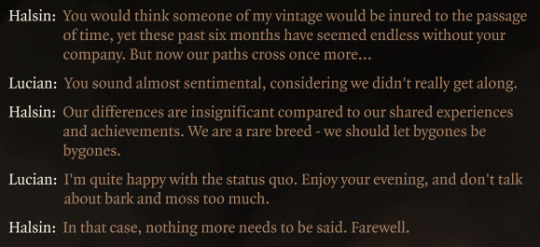
Playing a character who loves Halsin and romanced him, the conversation between you is extraordinarily long and sweet, and you are written as dear to each other. It includes, potentially: sharing stories and teasing him about his more salacious ones, talking about his love of children (and them loving the bear), learning how he's settled into his new life, hearing about him finally finding happiness, being welcomed into his community, welcoming him to share in drinks, and even joyfully adopting an owlbear. This image is just the very beginning of it.

Playing a character who disapproves of Shar but encourages Shadowheart to follow Shar anyway, you get a zealot's lecture about how you're being naive, thinking that Shar's exploiting people, likely confirming your feeling that she's a lost-cause cultist now. The happiness in the conversation is one-sided (from Shadowheart).
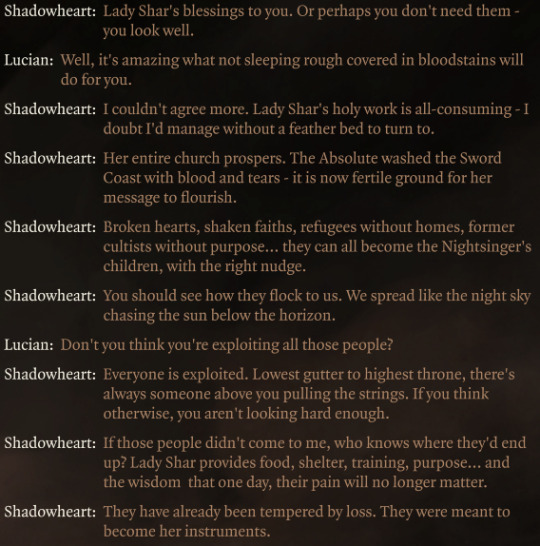
Playing a character who is fine with Shar and encourages Shadowheart to follow Shar, you get a short, sincere thank you, and she immediately starts trying to bond with you. The tone of the conversation remains upbeat as she expresses how pleased she is with the church despite its difficulties and how she'd do everything again in a heartbeat.
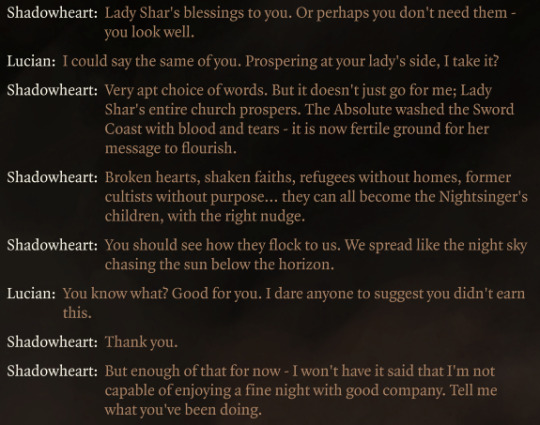
Playing a character who doesn't like being an immortal consort, but ascended Astarion and agreed to it anyway, gives you an Anne Rice-like fight between bitter eternal lovers. You also get some petulant dragging of your friends.

Playing a character who loves being an immortal consort and ascended Astarion gets you the dark fantasy of all-powerful monsters in love, gleefully ruling and exploiting the world (along with your friends and probably each other) together.
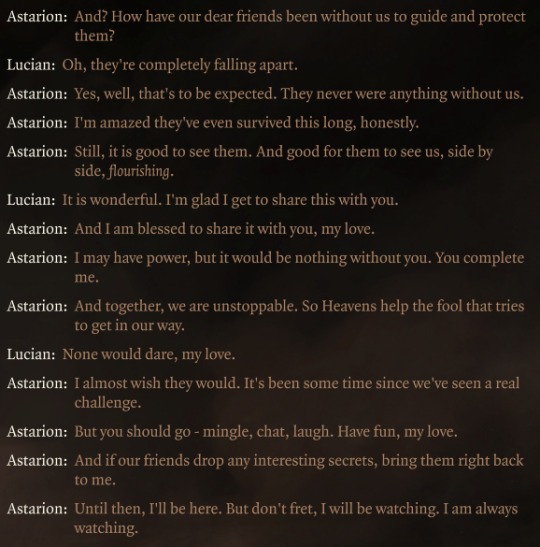
These are all valid endings to the exact same story with very different implications for the future. It's easy to muddy the potential narratives if you try to hold all the unique, mutually exclusive dialog options together.
Remember, at the end of the day, this is written as a linear experience. Everyone's epilogue choices are self-contained in their own story, even if it's possible to reload and choose a different final page. Have fun fishing for unhappy endings if the drama gives the flavor you enjoy, or seek out happy endings if you want to feel fulfilled by your choices. Just know that not everyone will experience or want to experience the same ending for an otherwise identical set of choices in game. That's the cool part of getting to choose your own adventure.
#bg3#baldur's gate 3#rant post#I really want to discuss how awesome the writing is for doing this#but I get a headache whenever I try to check out the fandom#i don't care what narratives someone likes#or hates#i just think the fact there are competing narratives that can almost all turn out 'happy' even if they're immoral is so cool#instead of a linear dialog 'tree' where you're supposed to click on every option before continuing and then be good to get a happy end#It's made each playthrough so unique#imo characterization discussions are best when a single playthrough's specific choices are considered parallel universes#because the game responds to what kind of story it thinks your Tav wants#and (mostly) gives you it within the construct of the story it wants to tell
51 notes
·
View notes
Note
Your fic (and Lofi, of course) has some of the strongest dedication to canon adherence I've ever seen in a DA fic, yet still manages to tell a wonderful new story within those bounds. That makes me curious though- how do you feel about other fics, which generally don't stick as close to the canon? Or fics that throw the entire canon out the window and do whatever they want?
Chejcjejd
Thank you >////< I take that as a compliment and confirmation that I’m doing a good job of fitting all the puzzle pieces we as the fandom have been given together.
Like, this is just mostly really specific to me cause of where my little ADHD/Autistic brain lands on the spectrum—
I’m extremely detail oriented and really get into my research when I hyper-fixate. But I feel my Master Doc for the Daycare Attendant kinda already made that obvious XD
Literally me:
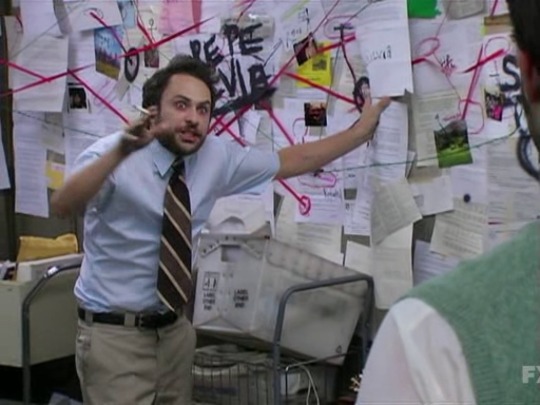
Also—
I and @dana-chan-the-control-brain—my partner in crime for years now—just REALLY love the challenge of theorizing and story crafting within the limitations of what happened in canon.
It’s fun and it lets us use our overthinking tendencies to do something creative instead of stressing over irl stuff.
We will slightly change things to incorporate any new lore as it’s found out/revealed (like it being canonically 2035 in Security Breach) so that it’ll still all perfectly fit with the narrative we want to tell without changing the core elements of either.
Like, without going into spoilers, the canonical year made us have a deep plotting debate session for things planned but not revealed yet that would need adjusting.
And I won’t lie, sometimes I can be really aggravating with trying to get things to fit and make sense XD.
But we eventually came to a revelation/decision, with some helpful input from @witchysolfan, that made everything work out to our advantage.
Also, also—
Security Breach actually allows for a lot more wiggle room than you’d think because of the fact it has multiple endings.
All the endings are canon to their own contained timelines, even if the TRUE Ending is the Afton one. It’s just a matter of picking one to follow.
And if you DON’T pick a canon Security Breach ending or decide to say none of it happened and forgo canon all together, that in itself is ALSO technically canon.
Cause Scott has confirmed that the different iterations of the FNaF story he’s presented through the games and books are all their own contained realities.
The books are “What if?“ scenarios involving if one, or two, or more things were changed and give hints for what happened in the main timeline: the game timeline.
Everything happened and even things that canonically DIDN’T still exist in another timeline as games or books as made-up stories (Or NOT made up stories that they’re TRYING to pass as fake as we saw in Help Wanted).
Like—
Let’s take the Sun and Moon lore leaked from Books #3 and #4 of Tales From the Pizzaplex for this.
@thatmooncake @pixelchills @ ing you guys for this part cause I think you might be interested in this take.
The books say that Sun and Moon were a repurposed theater animatronic and that Moon is sort of a glitch/virus that was always evil.
The books also say the generators were put in place cause of power-fluctuations to keep Moon at bay from the beginning of the daycare’s run.
Now.
This may be true for THAT timeline. But there are a lot of elements that can apply and change to make this fit anyone’s fic if they really want to include as many elements as they can (like me)
Moon being a glitch/always evil and a problem as the character who reveals this info says is a LIE.
Because what is Fazbear Entertainment REALLY good at?
Coverups.
Hiding the truth.
Because this fucking building as of the second Tales book is confirmed to be built on top of the corpses of 11 construction workers and 8 teenagers that snuck onto the construction site/.
There’s potential this dude is LYING that Moon was always a problem or a glitch. Moon could have easily been fine and really sweet and gentle with the kids when not playing around with them pretending to be an evil gremlin.
They also may have never served as performance animatronics and were always a daycare attendant from the beginning.
Their appearance and night and day concept was potentially intended for the theater. But maybe during their production things were changed, the previous daycare attendant animatronic (Foxy) needed to be replace and their AI reprogrammed even before they were first turned on.
Maybe Moon ISN’T a glitch and was preprogrammed in like Sun from the beginning and they’re just telling their staff that he’s just a glitch or virus that’s been quarantined so no one looks too deeply into his source coding. Otherwise they would see he was not only programmed to fill the role of watching over sleeping children, but was also intended to be “corrupted” (locked in “Evil”TM mode) and used to abduct these same children.
Or maybe he IS a glitch and the result of Sun’s programing splitting into two AI. But not a bad glitch. Not from the beginning. And they just decided to take advantage of and run with this.
If Moon was never intended, why is he everywhere?
Why would FazFuck Entertainment promote him as much if they were really trying to bury and forget about him?
Why HAVEN’T they tried to erase him from nearly every location of the Pizzaplex like they have with Bonnie?
There are so many possibilities and explanations. And all can be canon just as much as the initial claim in the books.
It can be true. It can be a lie. Or it can be a half truth.
And that’s just about Moon. I didn’t even touch when the generators were really installed yet.
Anyway, I rambled on a lot XD
I hope this answered your question.

#fnaf security breach#five nights at freddy's security breach#five nights at freddy's#fnaf#fnaf sb#the daycare attendant#fnaf moon#fnaf sun#fnaf sun and moon#headcanons
283 notes
·
View notes
Text
rambling more abt nightcord and their theme because i just NEED to get it out if my system
i think nightcord is such beautifully constructed with its theme of healing because every character has someone specific helping them out most within the unit
idk how to explain it in general terms but basically
kanade struggles with overworking and not taking proper care of herself, her main help with this comes from mizuki! sure, others help out too but mizuki is the one who points out those self destructive behaviours the most [or at least from ehat i remeber] and this dynamic is so so beautifully shown specifically in carnation recollection
mizuki is the one telling kanade to take a break, but kanade is set on making another song for mafuyu despite being absolutely stuck. i think mizuki is the most clever out of the 4 specifically because of this event, since they knew kanade wont give up on it ever and decided to use a different approach to give her the deserved break and would also help her out in this situation. kanade would never have some time off if it wasnt for mizuki. thats how mizuki cares for her, by "tricking" her into taking one while also getting to spend nice time together and end up reminiscing.
this is such an important story because thanks to mizuki, a part of kanade got to heal.
mafuyu very obviously is mostly helped by kanade, who tries her very best and gives it literally her all to help mafuyu find herself, but she always gives mafuyu space when she needs it as well. i think since this one is most obvious i dont have to dwell on it too much but the love and care kanade has for mafuyu makes me soooo fucking insane like omg. kanade is the whole reason mafuyu even tries. shes the sole reason why mafuyu could get where she is now and didnt give up.
ena is a bit tricky, but surprisingly i think her helper is... mafuyu. i have honestly no clue how to explain what i mean at all, but seeing someone with so much talent and the "perfect" life be completely empty was so important to enas character. mafuyu makes painfully slow progress on her situation yet ena notices it, and she might not fully realize it but its helping ena take things easier with her art as well, which i think is shown very well in hope will someday go beyond the morning. mafuyu makes just a slightly different expression but ena still notices it, paralleled by enas art teacher noticing enas intent and emotion behind her art project. despite so many mistakes in the work on a technical level, it had soul. not to mention mafuyu indirectly helps ena be more understanding of others, which is very obvious when you compare how she was with mafuyu at first vs their current dynamic. mafuyu doesnt even know it but she inspires ena so so much not only in her art but to be better as a person.
and for mizuki, its also very obvious with main help coming from ena. pretty much every mizuki focus [<- exaggeration warning] will have ena trying her best to help mizuki out, and thanks to enas growth she can understand mizuki better and better and know how to deal with their issue. she thinks she needs to know the secret to know mizuki, but she learns that its not actually important, and she wants to show mizuki that as well. she constantly shows mizuki support and care weather they are willing to tell their secret or not, and in her own way wants to reassure mizuki that no matter what she wants to be there for them. ena helps mizuki so much that they even finally consider telling ena their secret, after like a year in canon if not longer!! which is such a huge deal because mizuki was convinced that telling ena someday they will tell what it is was completely a lie. they never had any intention to actually say what it is. but they grew so much and feel so safe around ena that the fact they even CONSIDERED IT implies so much healing, growth and trust. it makes me SOB. i am INSANE about mizuena. ena loves them SO MUCH its just so JSHSHDHYSHEIRUDHXHJSNB
okay im gonna stop here cause the tired is getting to me and i feel like i cant explain myself at all now but you get the point n25 care about eachother so much it makes me cry and punch walls and scream and drop to my knees on the floor in a dramatic way and explode and-
#n25#rambling#pjsk#i should probably expand on some points here but#not now#if anyone wants me to and/or asks about it i will tho#just not today#my brain is melting into goop atp
12 notes
·
View notes
Note
I hope I’m not the only one here on your blog just for the Tokyo revengers content because I never watched Baki should i thought??
I have been very Baki focused as of late, huh? ^^; You are def not the only TokRev fan though, I assure you! My first really sizable chunk of followers came from my Taiju fic, and though I have been slacking a bit on posting anything TokRev related, I promise you much more is planned/being written currentl. A large chunk of bigger fics I am working on are actually mostly TokRev, I just wanted a lil break and so I focused on smaller stuff for a bit, and pretty much all of that happened to be Baki.
Now, as for if you should watch Baki…
Short answer: Yes! :D
Thoughtful answer: I think Baki is a very interesting take on the fighting genre, and I do highly recommend it. The saga of the Hanma family is as engrossing as it is entertaining, and there is a colorful cast of characters that support the series that you can’t help but love, hate, or love to hate. I have been kind of waiting for a Baki renaissance for a while now-I feel like other than in Japan, it really isn’t a super popular series and that’s a bit of a shame because it truly is an entertaining watch/read. The Netflix adaptation I think has helped the series a lot (and we are all grateful for it, to see our lovely boys animated so beautifully :)) and put it on the map for newer audiences to enjoy, but I definitely recommend the manga too. It’s a pretty fast read because a large chunk of it is action, but it’s pretty cool to see how Itagaki’s art has changed over the years and also how he has grown and changed as a story teller. Earlier Baki is much different than newer Baki, and some of the characters feel a bit foreign when you go back and reread some of the earlier stuff after being immersed in the newer content.
Baki also has some very bizarre and downright comical aspects as well that kind of put it on par with JJBA while making it very charming. The mangaka def adds some quirky flairs to his story telling, which while sometimes I can get a little annoyed/bored/confused with them, I feel like overall they make the experience of watching/reading the series its own unique and fun experience.
And if you love delinquents, Kaoru Hanayama is like… one of the best and coolest delinquents. If you put that man in Toman he would be running the whole gang within days and 90% of the bullshit everyone had to go through in Tokrev probs would have been resolved fairly quickly, if it even happened at all. This man would grind Kisaki to paste in the blink of an eye and I would pay to see it happen. :)
THAT ALL BEING SAID: Not everyone likes Baki, and that’s fine too. I know personally a lot of people are turned off by the art/how the characters look and honestly… That’s valid lol. I remember I once showed my friend a picture of Biscuit and her direct response was “Why does he look like he’s made out of balloons, like a clown constructed him?” LOOOL and often times if my friends mention weird body proportions in comics/manga someone inevitable asks when I am gonna chime in with a Baki manga panel. ^^; Most of the rest of my friends don’t really have any desire to partake in it though, and a few that have just really weren’t in to it. It’s very heavy on fighting and martial arts, and though the fighting is rather fantastical in a lot of cases, it (usually) doesn’t have supernatural elements or magic involved. So if that seems kind of bleh to you, you may want to avoid it.
Horny answer: Incredibly sexy men who are at least half naked a large majority of the time beating the shit out of each other is very fun, nice, and fulfilling to watch. :)
So I say give it a try if you are interested at all. At the very least, some of the fics on here may make a little more sense.
REGARDLESS THANK YOU FOR BEING HERE!!! Please stay tuned for more TokRev in the future, I have at least one more alphabet ask that is for a Tokrev chara so that may be the first thing I post, but bigger stuff is coming soon too~ <3

#I miss my delinquent boys#there are so many of them I want to write for and so many ideas i have begun uwuuugh#also dont feel bad-as far as minorities go I know there is at least ONE person who followed me after i posted my Zenos fic#who was solely here for FFXIV content#if you are still out there and see this... I love you and you are free to hit me up and tell me about your WOL at any time#<3#anyway thank you for the ask!#if you do watch/read Baki let me know what you think of it! :3#mothresponse
13 notes
·
View notes
Text
Writin’ Comics and Junk: Part 3 - Comic Compositionin' (Part 1)
Well, hey there pals! Are you stoked to be starting Issue #6? I sure am! The pages to come will be kicking our story into high gear in very short order, so make sure you stick around!
The next Dethkomic update will be
Friday, April 14th, 2023!
That's all we have for announcements right now! So if that's all you came for, you are dismissed! For the rest of you, I thought we'd talk about the specifics of turning a story into a comic book, today!
A brief primer on comic book anatomy
Comic books, like most things, have their own language when it comes to describing their construction. So that means I'm going to start saying some words that might not make a lot of sense to everyone. But fear not! I have come with visual aids!

1. The Panel - Just what you think it is. A pane of story. Each panel is itself a whole "beat" while simultaneously being part of a bigger picture. Storytelling with comics means putting the best snapshot of a scene into each frame and stringing them together in such a way that they remain cohesive, no matter how different each one is.
2. Dialogue Balloon - Or word balloon or speech bubble or whatever other name you want to call it. A lot of times, your panel layout and the decisions you make for what to include within your panel will rely on your dialogue (or absence thereof - see panel one). I don't just mean what's being said, but also how much. It's important to leave enough space for your words, after all!
3. Gutter - The space between panels. Sometimes stuff crosses into these areas, but usually this just serves to break up each scene. In this tutorial, I'll mostly use the term gutter to describe the "border" or "edge" of a panel area.

4. (Pointy) Dialogue Balloon - This is here to show you that dialogue balloons can come in many shapes and sizes! The edge here implies there is shouting. Have fun with these when you feel like doing so... Me personally? I've kinda taken the lazy approach on Dethkomic II's word balloons. They're all circles. Which is also fine!
5. Action Lines - Or motion lines, or whatever other words you might have for them. You wouldn't see these in real-life, but they help to push the idea of something in action, or something hitting with great impact.
6. Sound Effects - Just what they say they are. Use liberally in a comic about heavy metal.
7. This is a Bear.
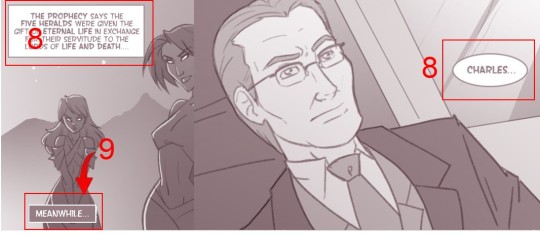
8. Dialogue Boxes and Voiceovers - I play it pretty loose with these and the rules of when to use one over the other. Basically, they're the same thing as a Dialogue Balloon, except the person speaking isn't in the panel. Typically, I'll use boxes when someone is so far away from the panel, they'd need to travel a significant distance (or through time) to be there, hence giving the feeling of a voiceover. Sometimes, though, if someone is close by, or what's being said is a continuation of something said on a previous panel, I'll just throw a balloon around the dialogue and leave the tail off. The speech is usually attributed to the last person who was talking, but so long as it is clear who's saying the words (or if it doesn't matter/needs to remain ambiguous), you can use either to great effect in "carrying over" a scene to the next.
9. Text Boxes and Captions - In Dethkomic, I color these darker than the dialogue boxes so it's clearer that they're meant as footnotes and not being "said" in the story. Good for things like editorial asides, translations, and setting-shifts.
As usual, there's more stuff that makes up a comic than just these thingies, but you'll see me refer to the above list of items the most when I talk about drawing up a comic page.
So, now that you know a little about the components of a comic book page and some of the basics about using each, effectively -- let's get down to the business of:
Laying out the panels in a way that best tells the story
As I said in the definition, panels are their own little beat and their own composition. While they can capture a moment on their own and make a great big sexy impact when they do -- they must stay true to the overall big picture of the comic's story as a whole. You probably don't realize it when you read most professionally published comics, but a lot of work goes into the ease by which you travel from one section of a page to the next. Transitioning is a hard thing to teach, but it's an integral part of making a comic successful. To that end, there are several pointers for working out an entire page of visual story, and getting it to translate seamlessly from top to bottom.
First, it's imperative to understand how comics are read. I'm going to be using the same page of story from Dethkomic's first issue to illustrate my points as I go. Feel free to check it out, here.
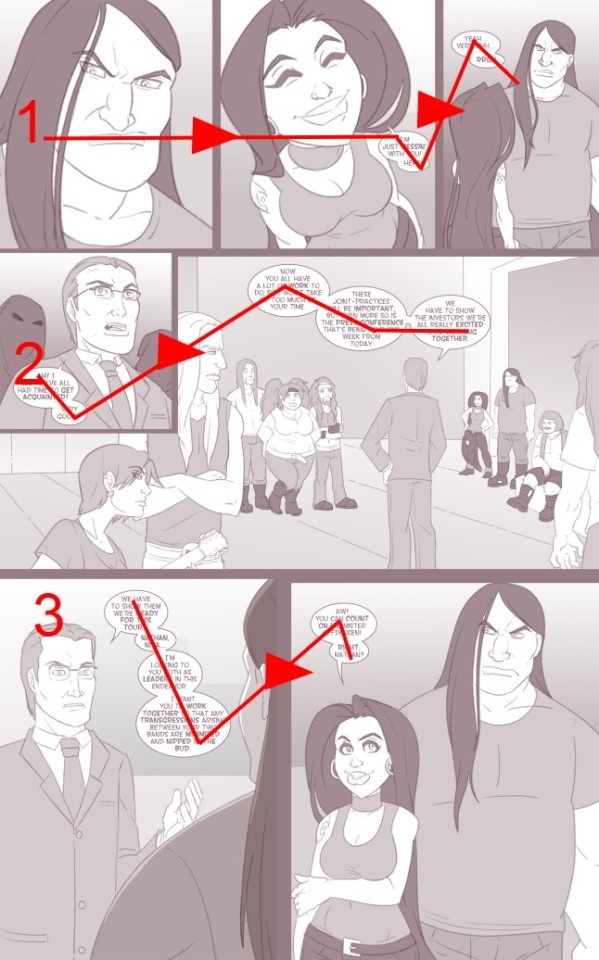
In the above example, we see how the page "flows" to the reader. And just in case you don't know, comic books in the United States typically read left to right, then top to bottom. The reader would read the first row of panels, first, then they would move on to the second and third.
Within each panel, the reader also reads left to right, top to bottom. Generally, you want to try setting up your word balloons with this in mind. There are exceptions (like the fighting that goes on in 5th panel of page 16 -- you can read any of those balloons, first. The order isn't the important part) Occasionally having your eyes go to the left is pretty forgivable (and sometimes necessary) in a panel, but note that the only time the reader's eyes go *up* is noted by the arrows, moving to the next panel.
Keep these things in mind, as one of the best ways to assure your panels are making sense and everything is coming together correctly as a whole, is to layout the entire page, first. That is -- treat the whole comic page as a picture. You can go in and work on individual panels, after the page layout is complete.
I start by making thumbnails -- little sketches of the layout, based on my script. It's a good way to see if things will work and fit the way I like.

I actually did an ask on this back here, and there's a few pointers in that post that might be of use to you at this point, too. The basic points are to convey the page's overall "beat" first, and work on the nuances of layout while keeping things as a whole in focus.
Basically, by this point you are going to try cramming as much of your script into the thumbnail as possible. Notice I say "as much of it..." because yeah -- edits will happen. The way I write, this usually means cutting things out, but it could also mean extending them. You begin to get a "feel" for storytelling in this way the more you do it, so don't be put off your project if it's not natural for you to try to work visuals and story together in this way. It just takes practice.
As to how you go about laying your panels out, I like to build on one panel and work around it as a focal point. I tend to think about a page this way:
What is *the scene* for this page? If there's one very special scene that ties everything going on within the page together, consider making this your focus point.
Are we entering a new area? If so, it'd be nice to have an establishing shot to establish exactly where the characters are. This is a shot that pulls the camera back a bit, letting the audience get a good glimpse of the surrounding area and where everyone is within it.
Is there any other important information we should be paying attention to? If you don't have *the scene* and if you don't necessarily need to establish where people are, then consider focusing on the point in the page that'll otherwise have the biggest impact on the story, going forward.
Now that you have your point of ultimate impact on the page, it's time to think about its individual layout as well as the layouts of all the other panels that go around it...
Laying out the story in a way that best tells the story
I'll get WAY more into this next time, but there's a lot that goes into comic book layouts beyond just "character A and character B are shown talking to each other". So what do I mean by this? Basically, laying out the story is laying out the nuances your audience can pick up on in order to tell how things are proceeding and where their eye should go next, etc. These are small things, but again, they can have a big impact on how your story is told. Some quick tips on story layout:
Change the size of your characters
Move your camera around
Don't cut characters off
Leave more room than needed
And I think this'll be a good place to pick up on the individual nuances of "directing" a comic, next update! As usual, thanks for reading and I hope you found this tutorial to be useful!
See you in a little over a week! And remember! Dethkomic loves you!
3 notes
·
View notes
Text
Story Pile: Megatokyo
New Post has been published on PRESS.exe: Story Pile: Megatokyo
Throughout 2022 I made a bit of fun on social media by reminding people that Megatokyo, the webcomic, was still updating, and had through all 22 years of its existence, produced a plot that at this point spanned roughly a week. It’s one of those things that when you present it to people who remember reading it as literal children creates an interesting reaction that shows you what they remember.
But what of me? What did I remember? I thought that maybe I should go check it out, and see what I thought of Megatokyo, since after all, I’d stepped out well before the talking robot girl had made a schoolfriend who was also the avatar of female tragedy. What is Megatokyo now? And how has it changed? Is it what you remember? is it better? is it worse?
What would I answer to the question, What is Megatokyo?
Content Warning: Y’know, there’s a lot of pretty nasty misogyny in Megatokyo, though not anything I’d step up to the level of a content warning. What I would content warn, though, is the commonality with which they suggest an adult Piro date a fifteen year old.
Megatokyo is a webcomic that launched in the year 2000, immensely successful for its form and platform, and one of those ‘top ten most popular’ things in its genre for a number of those years. Famously slow paced, erratic and unreliable in its update schedule, its claims to fame early on mostly were tied to its high art quality compared to other webcomics of the time and its quirky mix of Anime Softboy Piro and Libertarian Gamer Largo, and that’s kind of where the simple summary breaks down. You can’t really look at Megatokyo as the thing it started as, or the reason it was successful, because those things are amorphous and there’s a lot of assumptions. I mean I assume it succeeded because it looked good compared to a dozen sprite comics and stuff that looked like Sluggy Freelance. What’s more, ‘why it was notable in 2000’ is really unimportant in 2022, where I’m trying to look at what Megatokyo, the whole text, is.
The best thing you can give Megatokyo at the moment is abridgement. Twenty-two years on, waiting between strips and the dead strips are all no longer being drawn out by weeks at a time. The first year or so of comic strips are a breezy read, around 129 pages, which load nice and quick and honestly ricochet through the narrative at a pretty breakneck pace. I started this article imagining in my heart of hearts thinking that I’d just read all of Megatokyo. All twenty years of it, which totals up to about 1600 pages. As I write this down now, the ‘jot notes down’ stage of things, I am at 412 pages, which puts me in March 2003. That means that within the first 3 years of the comic, a quarter of it got made, which is honestly pretty good — that’s around 72 pages a year, which is about two pages a week. You could do a lot worse than that in a lot of serialised publications.
Of course, then there’s the question about what is or is not ‘Megatokyo‘ in this context. At first, I started by noting how often pages were what I filed as ‘padding.’ They were dead art days, ringer days, diary days, explainers for delays in the comic, and my numbers found that first ‘chapter’ of Megatokyo was composed of 83 ‘strips’, and 38 pieces of filler content. I don’t know if that content proportion holds; honestly, I imagine it gets worse, with more and more dead art days over time, until updates are instead interspersed with great big gaps of nothing, but I won’t know until I get there.
I wanted to make sure I spent some of this time noting down my reactions to the characters, the ways the story was telling me things and the things the story seems to think of as important, though, because it’s a lot easier to give the benefit of the doubt at the end of an archive binge, when you’re trying to construct the narrative in your own head. And I think that it holds that some of the best things you can do for Megatokyo is cut out a bunch of Megatokyo.
I need to talk about Megatokyo‘s author. No, not Piro. No, not Fred Gallagher. No, not Largo, or Rodney, or Dom or Ser. None of those people, but rather instead, the Author of Megatokyo, in a Barthesian sense.
Fred Gallagher fell out with Rodney Carston. Fred Gallagher has had depressive spirals, and personal medical tragedy and breakdowns and collapses. Fred Gallager is a person, and that person has been influenced in immense ways by material needs and constraints, and I will talk a little about what I think of that. But Fred Gallagher isn’t ‘the Author’ of Megatokyo and should not be regarded as such, because Megatokyo‘s author is the single mind that created the first strip and the most recent strip. Both of those people who did that were called Fred Gallagher, but they were not the same person by any measure.
I want to talk about what Megatokyo makes me think and feel and what it’s about as a historical millenial story. I want to talk about things that the text seems to me to be trying to do, because that seems the most reasonable way to treat this text as a whole object with its own ideas, and not as a diary of the breakdown of a man cursed in a way only capitalism can curse you. To that end:
The Author Of Megatokyo Is Dead, Because The Author Of Megatokyo Was Never Alive.
When I refer to Piro, I use that to mean the character Piro, and the fact that Piro is written by someone who for a while there wanted to be primarily known and seen as Piro is a detail that the diegesis can discard. It’s interesting if you want to particularly pick on him but I think that picking on him at this point is sort of redundant. The Author of Megatokyo then is the collapsed personality you can see in the work, a mind that would make the jokes that are made here and why they might make them. If a comic makes a particular kind of joke, you can probably reliably expect that the author of that comic finds that joke funny; just in the same way you can expect a comic made in English has an author that understands English.
Without delving too much into Megatokyo’s failings at this point, one thing I think is most important about Megatokyo‘s author is that they value nostalgia and impressions. There’s a shocking amount of things in the comic that claim, in some way, to be ‘about’ something in particular, or reference caring about a thing, but then demonstrate a breathtaking ignorance of it; if you told me the Author of Megatokyo had never been to Japan at all I wouldn’t actually doubt you. There are all these little giveaways, like the ways people have their meals, freely available guns, high speed highway chases, american-style health insurance and details like car accidents and a lack of attention paid to trains. This is not about Japan, this is about the Japan you think you like if you liked thinking about Japan a lot in 2000.
The Author has concerns outside of the comic that creep into them, too; there’s an antipathy towards internet forums and commentators, a distrust of normies, a shocking distaste for women and their agency, and a surprisingly common reliance on violence as a punchline in a way that makes me feel like they’re not very confident.
The confidence and distaste for women show up a lot more in the early parts, but don’t seem to have gone away around strip 500. Early strips relied a lot on the joke structure of someone being awful to a woman then being hurt for it, which meant, to make a joke, a lot of characters harrassed women. Repeatedly. A big part of this is a specific joke structure that was, I think, kind of Mcluahn-like, embedded in the form by another media.
Okay, okay, so this is a big reach, this is unprovable, but it explains a trend I lived through and I think that the story has some explanatory power. When I talk about it, please recognise this is a lens that works for me, this is an explanation for a trend that makes sense to me and I think helps me mentally avoid y’know, some creative problems.
I think that weeby webcomics are populated with a particular joke structure that occurs by trying to emulate an anime punchline.
If you watch a lot of 90s comedy anime, a very common thing is a character does something or says something funny but inappropriate, trying to get away with something they shouldn’t or being somewhere they shouldn’t, rather than stay and explain what’s going on or what they were doing, the show tends to keep things pacing on by having someone in the scene whallop them so hard they go flying out of the scene. This is a structure used a lot by Takahashi across her, let’s say, shithead-based narrative stories, and she used it for a lot of sex-based slapstick.
Webcomics that wanted to emulate anime aesthetics of the 90s were often being made by people who could reference that particular vein of punchline-PUNCHline moment. Also, and this is again, conjecture, I think a lot of webcomics were very keenly aware that they weren’t very funny. What’s more, they were often stuck with a four-panel structure, which means you’d get something like:
Panel 1: Framing for a joke
Panel 2: Setup for the punchline
Panel 3: The actual punchline
Panel 4: A reaction for the punchline
And I think, because overwhelmingly these were being made by people who weren’t boiling with confidence, panel 4 would be a reaction of violence, a shocking and abrupt ‘bam you got hurt for the thing you did,’ which was often a bad joke or a thoughtless line or a cheesy pick-up line. And that structure plays into how, in the early Megatokyo stories, a four panel comic that couldn’t come up with a use for its fourth panel would regularly have Largo say or do something misogynistic or awful, and then, the fourth panel is an understated observation of the aftermath of some violence. A doctor patching someone up, or a news report about someone getting hurt, or Piro hearing that something bad just happened to Largo.
What I’m saying is that an attempt to be Takahashi made Megatokyo into Ctrl-Alt-Delete.
Part of what bothers me in the reread is how much Megatokyo seems to have the edges of some ideas, as it is filled with conversations about media, games, and culture, but these ideas are so basic and stupid and dead-end with cliches. There’s this whole recurrent thread about how Piro liking dating sims was a problem because it made him weak, and not Piro objectifying real women was the problem.
It wants to comment on games because of Largo liking games but it has no idea about how people interact with games. It’s full of characters who clearly like hentai but is deeply dismissive of sex work, and in the same way, these characters seem to always be looking for a woman who is to blame for the things that are going wrong in their lives! Largo spends a huge chunk of the story at war with a girl because he thinks there’s something sus about her, and there is something sus about her, but even the ways he tries to address that involve approaching her as a problem who needs to be solved.
It’s not like this isn’t a story with some ideas in it. It’s definitely trying with both hands to pull together a bunch of different ideas, ideas that maybe had some purpose once, when the story started but as the story persists, the longer it goes without being able to resolve or conclude those story bits, the Author just keeps stapling together things they like. It also creates this weird phenomenon of backpedalling, sometimes as quickly as two panels immediately after one another, with a day between them. There’s a sequence where a teenager finds Piro’s books and her reaction at first implies that she’s looking at hentai he draws, but then the next panel, on the next day, opens with her saying ‘well I’m definitely not looking at hentai here.’
Then what the fuck was that first reaction?
This character’s reaction to Piro’s art is one of those other ways the story seems to be telling me ‘hey, here’s what you should think about this,’ and it’s also one of the ways the story underscores the theme of sadness. It keeps bringing up sadness, the sadness of a character, the sadness of an art, the sadness of a fandom, the sadness of a particular interest, and it keeps bringing up sadness itself as if the sadness is what makes someone interesting. This art is so sad, this artist draws sad characters, he was drawn to this character because there was a sadness to her (even if that wasn’t actually who she was).
I think Megatokyo is a story about how being sad is the same thing as being interesting. And hoping that other people in the world think that too. That a character with the right aesthetic presentation, the right drowned babymanchild, is inherently interesting. You should care about Piro because he’s sad. Piro cares about characters because they’re sad. That’s why he draws them to be sad. Piro’s emotional state is soooo strange, so unlike other boys, so much so that a brain-warping AI that manipulated people assumed he was a female player and he didn’t take well to being hit on in a game, where he was also, again, sad.
You can unpack a whole thing there if you want. Seems you can’t manipulate lesbians over the internet.
Good Girl.
There’s a lot of a particular kind of softboy fantasy to Piro. The character is the hub of a lot of attention from people who value him and his opinion a lot when one of his only acts of selflessness so far was giving away someone else’s money. And I don’t get why I’m meant to like that. I don’t feel like Piro is interesting because he is sad, I feel like he is sad, because he gets to be sad, because he keeps seeming to resort to sadness as a personality trait. He complains about the people around him, especially women, and that’s why he’s sad – because people are making him sad, and that’s not interesting. It’s wretched.
According to the timescale of Megatokyo, there have been about twenty days since the start of the story proper, with a two week timeskip early in chapter 0 to set up the predicament of our freeloading idiot protagonists becoming homeless. It means that the world of Megatokyo is a historical one; it is set in a year 2000 Tokyo where Fukushima Daichi hasn’t happened, where no global financial collapse happened, no impeachment of Park Geun-Hye or assassination of Shinzo Abe happened. Hell, in Megatokyo, Sega is still in the eyes of the gamer audience, a leading console manufacturer, which is why they have black vans and sick-ass secret cops with guns. The PS2 is a loathed upstart console made by an Enemy, Love Plus is eight years away, and Metal Gear Solid 2 isn’t out yet.
The entirety of this story then, is the work of a millenial weeby author, perhaps fresh out of college, writing and creating about the way they felt in that one period of time, as the memories get fuzzier and the culture moves on.
This whole thing makes me feel gross. These characters are iconic examples of millenial internet culture, and looking back on them, they make me revolted to remember who they were, how they were. I printed out some of these comics and had them in my schoolbooks. I quoted them. I probably still do, without realising the source of the phrases lingering still in my head.
I recoil from Piro, even remembering my time as a depressed boy who wanted to be prettier than I was and wished Girls Would Just Appreciate How Different I Was. I see the way that his behaviour and thoughts all seem to reflect a disdain for the women around him, and the way he used selfishness and indulgence as an excuse to treat his friends badly. Largo is meant to be the relief from Piro, and he makes me gamerphobic. Someone who has nothing in his life but Being A L337 G4M3R, whose ability to even process emotion is morphed around that, obsessed with his interests in a way that harms other people, and constantly seeking alcohol.
When viewed as page after page of a single text it’s very hard to think of Megatokyo very well. The characters are dreadful, and you sort of need to make excuses for them to put up with them long enough to watch the character development. They were rough, self-insert characters of thoughtless men, they can’t help it, how were they supposed to be good at storytelling?
There are two things in this comic, in the first five hundred strips that stand out now, in hindsight as needing particular explanation. Firstly, at one point early on, Erika and Hayasaka, two Japanese girls from Japan in Japan are having a conversation, and the topic of Hayasaka’s coworker Piro comes up. Erika asks if he’s American, and Hayasaka responds with ‘I don’t know.’ Now, the specific wording there is very obviously easy – after all, any given white boy could be from Canada, Scotland, Romania, Australia, or indeed, Japan as well, there’s nothing about his appearance that makes it obvious.
But these are Japanese characters from Japan speaking in Japanese, and Japanese has a way, as a language, to signify if someone is from Japan or not, and what’s more, in Japan, it’s really obvious that people judge and assume how Japanese you are or are not, based on how you look. That Hayasaka reacts with an ‘I don’t know’ is really weird, and makes me uncomfortable because it almost feels like it’s asking a specific question, “is he white” and the answer is meant to signify “how should I be able to tell?”
It’s a recurrent thing with how people talk about perceiving Piro, the character. He’s seen as female by a mind-warping AI in an MMORPG, a group of girls describe him as attractive (but also a lady), and the Erika moment leave me feeling like this character, in some tiny way, is meant to be a very obviously white boy, who can somehow be seen, in Japan, aracially; that he would ‘pass’ as Asian in a culture that is very aware of what that means.
Oh and one of those groups perceiving him as a ‘her’ includes a group of fifteen year old schoolgirls who are shocked to see a boy reading shojo manga. This is once again one of those things that projects that image of Japan, rather than being set in Japan, because lots of boys buy Shojo manga, it would not be an oddity that children gawp at. But it does let us chain into the other thing that I cannot stop thinking about:
Piro’s Conscience stops the story and has a chat with him about how he should not find those girls attractive, because they are fifteen and he is something like 23. And that’s almost a thing that you could point to as character development, except it’s weird that he needs to be told that by an outside agent, and it’s weird that the Author would think of that as an example of a way to have this character improve. You kind of don’t tend to need to explain ‘by the way, this character is not a sex criminal.’
But okay, the story says ‘Piro will not have sex with that teenager, as a point of ethical growth.’ Cool, not the example I’d leap to but I’m glad they do it. But and oh no there’s a but – but, they then have other characters remark on that, and there’s a plot arc about ‘oh no, what if this teenager hits on him?’
Yeah, what if?
What if this character who is definitely not a sex criminal now, because that’s a thing that the plot said he wasn’t, gets invited to do a sex crime? Well, maybe he’d do it? Because that character development is uncertain? Which means he’s probably a sex criminal, really?
These are the things that make me wonder about the Author of Megatokyo. It makes me wonder, as with other works before it, why would you bring that up?
It’s hard not to be bitter about Megatokyo. Megatokyo was wildly successful on the con circuit, it had printed books and cosplayers and the creators in the first year of the comic’s life went from ‘nobodies with a comic’ to ‘celebrity guests at major conventions.’ And this is in that period where of 121 strips, 38 were just empty filler. There was a lightning strike of it all, and I know that impacts how I feel about it in hindsight. We were hanging on to see the plot developments? From this? At that point? A year in, knowing that twenty-one years later, many of those initial plot points are dangling or forgotten?
But, and now I’d like to talk about Fred Gallagher the person, and not The Author of Megatokyo. I think Fred Gallagher received a special kind of torment that only capitalism can truly give. In a fair or sensible world, Fred wouldn’t need to do this art in a way that generated revenue; he’d be able to do it in his free time when he wanted to and release it at a schedule that pleased him and find a stable feedback loop that worked for him, all while his other needs were met. He wouldn’t need to work as an architect, then as a bus driver, in order to make ends meet while he pushed on with Megatokyo, a thing that he can manage to update maybe twice a month with a single page, often a page full of wordswordswords.
Megatokyo got successful in a capitalist way, and it demanded that in order it work, it had to be consistent, it needed attention, it needed monetisation, it needed to be a hustle, and the result of it really looks like every part of that sucks. Gallagher has written about being a temperamental writer and artist, and doesn’t that bear out in a work which could have months of breaks between its haphazardly crafted plot beats?
Megatokyo is a project that could benefit now with a good editor going through a draft manuscript and saying ‘hey, is this not important? Maybe we get rid of this’ or ‘what are we doing with this?’ and maybe ‘a few less jokes about the fifteen year old flirting with an adult, perhaps?’ and then letting the perfectionist who wanted to drive the story come back through that process and engage with it in its own time. It doesn’t need to be a commercial platform that justifies its existence; it could be a shed project, something someone who loves it does to work on it a little at a time.
But it isn’t.
And the demands of making A Business, a Brand, are clearly things that really hurt its actual existence. The more upset and the more struggle that Gallagher has to go through to make it, the less likely it seems to me that it gets made. That’s the story of what happened to the visual novel (which still shocks me in that it seems like it’d be very easy to get something out, but which now, all that money has dried up).
Gallagher has a patreon. It pays for Megatokyo and it pays for his other webtoon work, which seems driven by improvisation and speed. It gets updated a fair bit more often than Megatokyo with more coherent, directed sequences. I do not wish ill of this man, and for all that I wish the culture had venerated something else, uplifted someone else, I do not want this project to be a failure, to be gone. I’d like it to be better – boy, I’d like it to be better, such as discarding all the jokes about the fifteen year old flirting with an adult, could we please stop that.
But it’s hard sometimes to think about it, about the unfairness that this got to be a Cultural Touchstone where someone nearly twenty years older than me got to be one of ‘the voices’ of my cultural space, and where now he gets to continue making a page or two a month, while some of my friends have to negotiate ‘groceries or rent’ problems with their online presences and the art they give away.
Is Megatokyo, the project, worth a few thousand a month? I mean, yeah, absolutely.
But it doesn’t seem fair to me that this project, this project, limping along over twenty two years to tell a story that is awkward and illformed and thoughtless and selfish and indulgent and focused on some characters who are kinda rotten assholes, gets to be the place where the cyberpunk dystopia is unevently distributed.
There’s an impulse to pull the punch here, or to be crueller. That somehow I should either be kind enough because Gallagher’s been through a lot (and he has! I don’t mean to downplay any of the realities of Being The Megatokyo Guy!) or be able to lay a knockout punch on the work and get rid of it, which, no, of course not; Gallagher should be happily working on this project in his own time in a way that appeals to him, it doesn’t have to go anywhere or have a goal. In this house we don’t do disrespectful teleologies. Maybe I should be ‘aw shucks, well, that Piro learns his lesson after four straight years of narrative,’ but to get there I have to slog through twenty two years of archives, most of which is irrelevant and boring.
Ah well.
Make art, make rent, help others do the same. And helping others make art can be stuff like reading your friends’ work, and asking them if they want to do things differently, or better, or with fewer jokes about flirting with underaged girls.
Check it out on PRESS.exe to see it with images and links!
4 notes
·
View notes
Note
can you give us more thoughts about domestic yoongles? the taemin's one (wich I love) just made me miss the cat boy so much ;o;
i have a phd in househusband yoongi so let me fire out some ideas for ya.
myg at home headcanon
🐱 word count. 1.9k | fluff, slice of life, slight nsfw mentions, x reader, bullet points
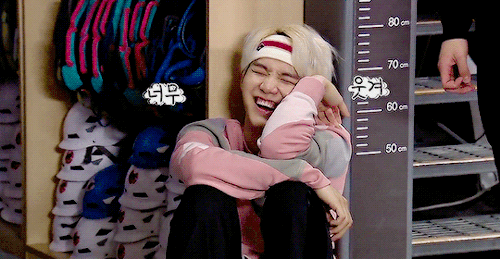
The doorbell sound is a recording of Yoongi imitating a doorbell. He’s such a meme. Ceci n'est pas une pipe.
Seemingly, he teaches himself a new recipe every week. To perfection. Yoongi is very particular about sticking to the recipe and wielding his kitchen tools in the right way. He collects knives, olive oil, and still hates cutting onions.
He separates sleep time, work time, and couple time as the holy trinity. For each, he switches his mood.
Blushes easily no matter for how long you’ve been together.
Establishes his own radio show where he DJs at one point.
Yoongi keeps an extreme track on the garbage schedule. He knows exactly what is due when. Separating the trash is a must. That includes sorting out fake friends trying to get between your relationship. Your social circle as a couple is extremely deliberate.
Yoongi deems himself a terrible host for guests. Unless Hoseok is there to drag him out, it's true he rather stays in the kitchen or at the barbecue preparing the menu courses rather than making small talk. He leaves the hospitality bits to you, however you want to go about it.
What he lacks in conversing with guests, he makes up in bed, God is absolutely fair.
He sings and hums pretty often and has his own vernacular of extraterrestrial uwu noises. It's an alphabet that you have to yet decipher but it's incredibly cute.
Self-made paintings everywhere around his house.
Yoongi hasn't gone clubbing since grammar school. The most he does is going to a restaurant at lunch with very close friends. And always in a work context. His private life is so secluded from everything else and paparazzi just don't spot him anywhere, Dispatch thinks he must live abroad.
Very well, he does consider his big ole house a separate country. It's a living organism with a studio, gym, trophy room, small-size basketball court, and vastly equipped kitchen. A home theater as well, he likes American movies (like Inception) and Korean action genres, and you can stream whatever you fancy in there whenever you like.
Yes, he has underwear with cute little bears on.
There's even a little pond in the backyard. Yoongi, Pisces he is, likes fishes after all. Sometimes he sits at the edge of the 'Little Ole Min Lake (LOML)' and stares into the water for literal hours with his chin parked on his palm.
His fridge is so high-tech and futuristic, even Yoongi is rendered clueless by its AI sometimes. The washing machine, too.
Yoongi watches RuPaul’s drag race. What did you expect? He finds it so humorous.
Owns lord knows how many comic collections.
Favorite holiday destination: New York.
Christmas is basically 50% you unveiling new music equipment to him in the garage and Yoongi almost fainting at the sexiness of it. The other 50% is spent holding hands and orgasm after orgasm until the new year since you loose track of time.
Goes on long rants why he’d marry you again every weekend.
Making you presents is his specialty. Always accompanied with a hand-written note. He writes a lot of things by hand for you in general. Texting, basically never. Always on paper.
No sex without a blanket and socks on. Yoongi gets cold very very easily and just doesn’t like showing skin. You buy him a heated blanket for his birthday, he even uses it in his studio chair.
Chronically addicted to making out.
Matching black outfits and glasses.
Laughs at even your worst jokes or phrases you didn’t expect you even uttered.
Yoongi owns the phoniest, most secretive-looking black car ever and nobody knows about it. Even he forgets he owns it, in fact he genuinely acts like it just doesn’t exist. Hilarious. And that guy has a level 1 Korean driver's license. Which allows him to drive trailers and busses and fucking trucks, and construction machines, let that sink in.
It's really a genius curse. Yoongi being put to the test will always deliver but he won't choose to execute his full skillset if he doesn't have to. Well, pragmatic. He's not as phony as he thinks he is, which is even more hilarious.
He uses that behemoth of a car so scarcely because he'd rather have things delivered to his doorstep and he's stingy with gas. Also, he doesn't like traffic and driving because of the traumatic shoulder accident and his tendency to space out. Translation: You drive that thing... that monster... it really is an impressive, fast, and scary machine.
If someone devious ever even remotely manages to invade his privacy and get past the doubly-installed security system, he has enough money to deal with it no matter what.
If it concerns your privacy, he's a red belt. And owns Jin's number if a taekwondo master is required. Jimin's if it needs someone with kendo skills.
If Yoongi needs someone to go on a complete rampage, Jungkook lives just down the block. He can sprint to Yoongi's bunker I mean mansion within 45 seconds. 30 if it's very urgent. 20 if the reward is an instant ramen splurge with Yoongi's black card.
He has a sexy, glamorous sword collection hanging on the living room wall anyways, so. Who the hell is dumb enough to mess with him and his expensive lawyer in the first place.
But just in case, who knows... Yoongi settles matters shruggingly, anonymously, and with cash and he's too exhausted for violence, but don't underestimate his deter-min-ation and network for emergencies. Also, he is Agust D after all.
He will bonk a naughty burglar or kidnapper across the head with a wooden cooking spoon or take him down by throwing a basketball if the situation requires it. Damn, his reflexes are so fast, a feral cat in motion. So, lean back and sip on your drink of choice. Things are cared for.
If Yoongi is the one being kidnapped or a highly skilled stalker invades the property at night when he's fast asleep (nothing can wake this man during certain hours, strong REM right here): Don't forget that honeyboy is a Dodgers fan. There are signed baseball bats everywhere in this damn house.
In that sense, your parents visiting you here for the first time thought you were an undercover thug couple. Not to worry mom and dad, you both just like sports very much okay.
Yoongi walks around in all black clothes and the rooms are all seemingly dark. Even if you live together, you don't know his skin care routine. It's clear to you he's some sort of vampire.
Since Yoongi always forgets to remove his makeup, you made it a habit to wipe it down when he's about to pass out. He won't lie, he enjoys that kind of affection.
Holly is your resident child. You're essentially a family.
He insists to tackle this by himself, Yoongi sees his therapist monthly. Not shifting responsibility is something he's stubborn about and he pours his emotions into writing. You will do conversation about deeper stuff, but he says it's mostly up to him and his own mind. He dislikes burdening you or opening up too much and it's something to respect rather than force him about. If he wants to share a thought, he will. It doesn’t mean he can’t trust you or sucks at communicating (we know that he’s direct). Yoongi simply can’t put that much pain in such few words nor should you alleviate it for him.
Calls from the manager faze Yoongi as much as Jimin is bothered by gravity. If he’s busy kissing your body slow mo, who the hell dares to disturb his worship.
This man had so many let-downs and interpersonal catastrophes in his life, he's super discerning with people. Because he rolls that way, during their first meeting Yoongi uses his psychology certificate on your friends. You see him squint at them, he listens very closely. After they pass the vibe check aka meow radar, he befriends them, too.
Yoongi doodles Grammy trophies everywhere to manifest them.
Yoongi shaves his legs.
All the sex toys he’s ever bought are black. Gotta vibe in style.
He spends ridiculous amounts of time in the studio but he's yours for the remainder of the night, breakfast, and he makes a lavish lunch and dinner.
Um, consider his head parked between your legs. The Hongkong line was not a joke.
Doesn’t mind you squishing his cheeks whenever and for how long you like.
Every other weekend he gets flowers, vouchers, and gifts — not because of fans, they don’t know where his house is, but because he donates so much.
Namjoon often drops by and cleanses the area with his crystals.
Yoongi is a photography major so you can ask him to take professional, ceiling-high black and white shots of you.
Feeding each other food lovingly. Man, this guy got lips.
He set up a library just for you, in the exact historical aesthetic you like the most. Send him the link to any book you want, it's basically in the online shopping cart already. As I said, he wants to make you presents like every week.
Sometimes he sits on the other end studying English videos and vocab while you read. And yes, he's already 95% fluent but pretends being merely intermediate. He knows technical terms even native speakers have never heard of.
He collects pajamas and earrings.
Swears on the phone.
Namjoon being the horniest member is a cover-up story. Yoongi masturbates almost unreasonable amounts of times, by himself and in your arms when going to bed. Not gonna lie, it’s a sight to see his hands at work. He’s almost equally obsessed with fingering you once you ask him.
Yoongi was the one asking you to move in and almost had a nervous meltdown before meeting up with you to tell you just that.
He’s the little spoon and of course a sleeping burrito to hold tight.
Finds you equally attractive in any state or styling. Yoongi practices what he preaches, he always reacts the same and says the same.
Jams out to outrageous beats Namjoon sends him by dancing in the studio. You walk in on him every time. Was embarrassed at first, now you dance along.
Has bought you a life-sized Yoongi pillow and customized you a giant Shooky to hug when he’s not at home over night.
Owned a wine cellar until he quit drinking. Turned it into a piano room instead.
Only you know Yoongi has a serpent and dagger tattoo.
Scrubs the bathroom religiously.
The house smells like restaurant food and his extravagant perfumes half of the time.
Sometimes he has to remind himself he’s married to you and not his coffee machine. He shall be forgiven. You can’t complain that he doesn’t love you enough, nor is he ever not adorable when drinking his latte.
Never wears short sleeves. It can be scorching and he’ll wear a jacket.
Tell him and the cap stays on during sex.
He grows his hair out and puts it in a low bun. The bangs remain.
Yoongi has installed the most fire-proof building in the entire city it seems. That he wanted to be a firefighter when he was young definitely shows. Figures the house has to be protected from heat: His blasting studio music and Yoongi himself are just way too sizzling.
Still melts into a puddle when you kiss his nose.
Couple sunrise watching.
© submissive-bangtan 2017-2021. all rights reserved. do not repost or translate. all depictions fictional.
516 notes
·
View notes
Text
consequence / pt i

⛔️ Warning: This is an exploration of Zhongli’s manipulative tendencies that we see glimpses of in his archon and story quest. Absolutely no part of the relationship depicted here is healthy or consensual. Please proceed with caution.
🔖 [info] [next]
—
pt. i of iii
Looking back, you should have noticed that something was wrong the moment Zhongli had insisted on treating you and Aether to dinner.
You and Paimon tried to stop him, of course — far too many of his shopping sprees in the past had ended with the Millelith involved or your pockets emptied of Mora (usually both, really). Yet today, he’d produced a wallet lined with gleaming coins, and any protests died quickly on Paimon’s lips.
“Wow, that’s enough to buy—” she marvelled, staring as intently as though her gaze itself could start pocketing the Mora, “at least… TEN Golden Crabs from Wanmin Restaurant!”
Zhongli chuckled, the sound still sending pleasant shivers down your spine even after all the months you’d spent traveling with him. “A little more than that, Paimon, but a good guess nonetheless.” He turned his amber gaze to you and your brother, who had not strayed a foot away from you since the Abyss released its hold on him.
Aether had kept an easy smile on his face for the past few days, but you’d known him long enough to pick out the signs of guilt, despite your reiterated reassurances that what the Abyss did to him was not his fault. It would take a long time for him to feel alright again; and you’d be there for him for as long as it took.
“And as for you two?” Zhongli continued, “will Wanmin Restaurant be agreeable? Though of course, if you believe that such a momentous reunion demands something a little more extravagant, I’m sure that Xinyue Pavillion is still taking reservations—”
“No, that’s not—” you weren’t sure why you were hesitating. So what if he mysteriously found himself without enough Mora by the end of the meal, and you ended up having to foot the bill as usual? It stung a little to think about, but it wasn’t as though you’d have any need for Mora after tonight. “That’s not it. After everything you’ve done for us during our travels, I couldn’t possibly accept more from you, Zhongli.”
Couldn’t possibly bear sitting at a table with Zhongli, knowing that it’d be the last time you’d ever see him. This was why you’d always tried to leave each world with a clean cut. This was why, at the break of dawn, you and Aether would leave without telling anyone — not Jean, not Cyno, not Dainsleif, not Ajax. Not even Zhongli, with whom you’d spent the bulk of your past year.
“Oh, no,” Zhongli replied, brows arching upwards, “I’ve told you, have I not? The pleasure of our travels were mine to enjoy.”
“Er... well. I’m sure Aether is also tired and wants to rest,” you prompted, squeezing Aether’s hand. Aether nodded quickly — no matter the world, you’d always been able to count on him to pick up on your nuanced signals. Though he might not know why, he knew that you were uneasy with going to this dinner, and that was enough.
“Hmm,” Zhongli pondered this shortly, then turned to your brother. You’d seen that look of calculated determination on his face before, in front of basha stalls and souvenir stores across the continent. A look that meant Zhongli would get what he wanted. “I had rather been looking forward to getting to know the sibling of my favored travel companion. Are you certain? Wanmin Restaurant is quite the gem of Liyue Harbor, and I’m certain that the food here will be a fair few notches above what the Abyss Order has been able to offer you.”
There was a slight, amiable smile on his face, but bringing up the Abyss was a painfully low blow and you had no doubt that Zhongli, the lord of contracts and negotiations and everything in between, knew it. You watched in mute horror as the guilt and regret danced on Aether’s face, before he finally gathered it all back into an apologetic smile. “Of course, Mr. Zhongli. Far be it from me to refuse a dinner with the former Geo Archon himself, especially with all the trouble I’ve caused you...”
—
Even after traveling the seven nations, you’d never once stopped pining for the savory, hearty flavors of Liyue cuisine. The spice of the black-perch stew that Xiangling taught you to cook had kept you warm through many a Snezhnayan blizzard, after all. Basking in the familiar scent of Wanmin Restaurant with a stomach full of hot food, and watching Paimon devour skewers of meat five at a time, you began to feel much better.
The anger you’d felt at Zhongli’s manipulation of your brother had also since faded into contentment. After all, negotiation, you found, came as naturally to Zhongli as breathing; he had likely meant nothing by it.
Maybe it was okay that you spent just one more night with Zhongli. Maybe it would turn out to be the closure you need.
You glanced at the man in question; he was teaching Aether how to use chopsticks, of course, and you were grateful to see that the haunted look in Aether’s eyes had given way to exasperation for now. By the time your brother had snapped his third pair of wooden ones, he was smiling and Paimon was just about rolling around on the ground in glee. As you stifled your own laughter, Zhongli set two small bottles of wine on the table.
You tried not to let yourself think about how the string lights of Chi’hu Rock glinted like stars in his eyes.
“What’s this?” You joked, referencing Zhongli’s anger from the one time he’d seen Venti get you drunk. “Are we all to become disgraces to the arts tonight?”
Zhongli’s lip curled into a small smile. You couldn’t remember when his smiles had started coming more and more frequently, but you’d learned to savor each one. “Ordinarily, I would not condone such strong drink, but today is the most special of occasions, no?”
As you watched, a goblet began to form between his fingers, golden, black and resplendent. You’d seen similar ones before, buried deep within the Domain of Guyun Stone Forest — an Archaic Petra Artifact, a Goblet of Chiseled Crag. According to Zhongli’s stories, the very same ones that he had created for the Seven to drink from in celebration, before all but two of them had vanished from this world.
The cruel irony was not lost on you.
“Besides, this is nothing like the watered down Mondstadt alcohol that that young bard partakes in,” Zhongli said, gloved fingers masterfully plucking the cork from the first bottle and pouring it into the goblets. “These two bottles contain the finest wu’liang’ye spirit that Liyue has to offer. They’ve been aged for well over decades with a technique passed down from the goddess Guizhong, whose mastery over grain and crop transcends even my own today.”
“We’re— flattered,” you bowed your head. The matter of Guizhong, the late Goddess of Dust and Zhongli’s good friend from when the Archon War still ravaged the land, was but one of the many things that you’d wanted to talk to him about. If only you had more time. “Thank you, Zhongli.”
He passed you the first goblet, then the second to Paimon. “Please, let’s forgo the formalities tonight. You are a dear friend to me, and so, by extension, is your family.” The second bottle was opened, its contents split between Zhongli and Aether. “Let us drink, to the happy reunion of loved ones, to the fruitful friendships you have forged in this world, and to all the triumphant adventures to be had still.”
The wince you hid was only partially from the burning drag of liquor sliding down your throat.
It had not escaped your notice that Zhongli had been staring at you all night — more intently than usual, and that was saying something.
“y/n, I think—“ he began, as you met his gaze. By the Archons, the way he said your name—
“ Paimon thinks there should be less talking, more drinking! Ganbei!” Paimon screeches, downing half her goblet and immediately falling down to the cobblestone road, spluttering and choking at the heat.
“This is… very strong, Mr. Zhongli,” Aether was the first to speak after. “Wonderful liquor. What gives it its mild bitterness?”
“Bitter?” You asked, letting the drink roll on your tongue, “where’s the bitterness? It tastes mostly sweet to me.”
Aether took another long drink, thoughtfully. “Definitely bitter. Here, try a sip?”
You took his goblet, but as you pressed it to your lips, you felt it begin to violently vibrate. Quickly, you pulled it away from your face just in time for it to shatter in your hand, gold and black shards falling to the floor as what little drink left in the goblet splattered across the table.
“Goodness,” Zhongli said, after your surprised yelp brought Paimon stumbling back to your side, her cheeks still stained scarlet from the liquor, “I must apologize. It’s been quite some time since I’ve had to construct something so small and intricate — I am out of practice, it seems.”
“Oh! That’s quite alright, I drank most of it already—“ Aether glanced over your shoulder, “by the Archons, Paimon has a knife!”
As you watched Chef Mao try to wrestle his knife back from a cackling, red-faced Paimon, you recalled the crystal hairpin Zhongli had forged two months ago — when you’d complained of the Natlan desert wind blowing your hair into your eyes. It had been just as intricate as the goblets, and much, much smaller. One of the few belongings you were planning on bringing with you.
You wondered what reason Zhongli had to lie.
—
“Maybe it was a good thing your goblet shattered,” you told Zhongli, prodding Aether with one of your chopsticks. He had stopped even groaning in response. And though Paimon was still conscious, she looked as though she would much rather not be, sitting forlornly on the table with her head in her hands. “Look at them. Drunk as skunks.”
“Maybe,” Zhongli replied, “though I did not expect these two to have such low tolerance to alcohol. It was a miscalculation on my part.”
“Paimon’s always like this —you know, remember that bar in Snezhnaya?— but Aether’s usually better at holding his drink,” you sighed. “I should probably get him back to Wangshu Inn.”
“Let him sober up a little here. It’s a long trek to the inn, and you don’t want him making a mess of his dinner on the way back.” Loathe as you were to admit it, Zhongli was right. It seemed that the fates were demanding that you spend a little more time with him, after all. He stood up, his tremendous height still a little startling to you.
“Will you walk with me for a little, y/n?”
It wasn’t fair, really, the way he said your name. “Where are we going?”
“I’m not sure,” he answered. “The harbor for a breath of fresh air perhaps, or Bubu Pharmacy to fetch a remedy for Aether. Does it matter to you, where we go?”
Going anywhere with him was a pleasure, one that against your better judgement, you yearned to partake in one more time. “No,” you admitted. “Let’s go.”
--
“It’s been so long since we’ve walked through Liyue — a year, almost. Do you remember? It was my birthday, and we walked for hours through the harbor.” Zhongli chuckled, the sound a deep rumble through your bones. “You wouldn’t let me buy dinner that time, either.”
The nights of Liyue, its rolling hills and monumental mountains, were a peace you’d never known before coming to Teyvat. The city was uncharacteristically quiet tonight, and by the time you got to Yujing Terrace, you realized that it was the emptiest you’d ever seen it. The usual evening crowd of kids out of school and elderly taking strolls were nowhere to be seen — not even the Millelith guards usually standing by the gate were there.
“ That time ,” you corrected, swallowing your unease at the silence of the city, “you didn’t have a single Mora to your name.” The strides you had to take to keep up with Zhongli’s long, long legs were huge, and you struggled to stay by his side. “Look me in the eyes and tell me that I wouldn’t have had to pay the entire bill if we’d actually gone to Wangshu Inn for dinner that night.”
You immediately regretted it when he turned his golden gaze upon you, and it took everything within you to not avert yours. “Perhaps that may have been the case,” Zhongli allowed, “though I would have returned your investment tenfold over the next week. Have I not proven as much throughout our travels?”
His vast knowledge of valuable gemstones and herbs — and more importantly, his uncanny ability to get any deal he set his mind to — had kept you and Paimon fed for many a week during your trek through the caves and jungles of Sumeru. You had to give him that. And that wasn’t not even counting the number of boulders, traps, swords and ravenous winter wolves that his shield had protected you from—
“Fine, I’ll admit, it was nice to have you around, you bourgeois parasite,” you said, playing on his joke back from when you’d first met. Then, after a brief silence, “Zhongli, in all seriousness, thank you.”
“Hmm?”
“I know that you’ve accompanied many adventurers on their journeys,” you explained, “but you — you dropped everything and journeyed with me, and you’ve done more for me than anyone else. I could never have found Aether without you.” Zhongli was being uncharacteristically quiet, and so you hurried along to fill the silence, “We— we made a great team together. And I will never forget everything that you’ve done for me. So, thank you.”
“A great team together...” he repeated, voice lower than a whisper. “y/n, this sounds like a farewell.”
Your breath caught in your throat. Even in silence, you were breaking the most important rule you’d learned throughout all your travels. Never let them know you’re leaving.
Zhongli turned to face you, and his full attention is a force that you had not yet learned to endure. So instead, you turned your attention to the koi darting about among the lotus reeds as he continued, “I’ve noticed that you’ve been more careless with your Mora lately. And as for your hard-earned weapons, artifacts, and resources, you have given them all to the Knights of Favonius, correct?”
“I gave some to the Millelith too,” you objected quietly.
“You know that is not what I meant,” Zhongli said. You did know. “Are you planning on leaving this world, y/n?”
“I have to,” you heard yourself say, “we don’t belong here.”
As though he heard the waver in your voice, the Lord of Contracts honed in on it like a Sumeran jaguar. “Do you remember the first Lantern Rite you partook in? Though you had just arrived in Liyue, and though the Millelith, Qixing and Adepti each gave you reason to distrust them, you still chose to spend the festival helping people.”
“I didn’t help that many—”
“Twenty-six people,” he corrected, and you cursed yourself for not thinking that he would remember. “A dozen more, if we are to count the young and elderly of Qingce, whose lives were brightened by the festivities you brought to the village. And hundreds above that, if we acknowledge every person in Liyue Harbor, whose Lantern Rite would have been ruined had you not stopped the thief who tried to steal the Mingxiao Lantern. Am I correct?”
“I did it for the compensation,” you retorted, determined not to let yourself think about the people you’d helped. Who would help them after you left?
“Hmm.” Zhongli rested his gloved fingers against his chin, and you could tell that he didn’t buy your bluff, not for a moment. “Anyone else, I may have believed. But you, y/n, who have begged me to stay my hand against fleeing Hilichurls? You, who could not bear to attack the Mitachurl that sits alone on Mount Tianheng and watches the harbor? You, who gave it a name ?”
“Okay,” you finally relented. “Okay, I like helping people, and I don’t want to go. But that doesn’t mean I can stay. It’s— it’s not good for Aether to stay here, after what this world has done to him.”
“With time, I believe your brother can adjust—”
“Don’t make this harder than it has to be, Zhongli,” you begged, and the tone of your voice finally made him take notice. He regarded you for a moment, and you thought you saw his eyes glow bright.
“The last thing I wanted,” he sighed, reaching into his coat, “was for it to come to this.”
Your first reaction was to reach for your weapon — it wasn’t there; you’d given Festering Desire to dear little Bennett just before you’d left Mondstadt. Still, you felt the bright burn of shame when the only thing Zhongli pulled out was a piece of parchment, folded into a perfect square. How could you think that after everything, Zhongli would ever hurt you?
“Do you remember this contract of ours?” Zhongli asked as he carefully unfolded the paper, handing it to you. You stared down at the neat lines of calligraphy, punctuated by your name in your own handwriting.
Of course you remembered: the moment you had approached Zhongli at Wangsheng Funeral Parlor, after your expedition into Havria’s domain. The day you’d asked him to join you on your travels.
“ Oh? A new contract? I'm still on leave, but I can accompany you for a while. ” Zhongli had mused, as though he hadn’t just sent butterflies soaring through your insides. “ What name should I use on the contract? I have a great many names, though when on leave... I tend to go by Zhongli. And you, Traveler? What name will you be signing on this contract— ?”
The following contract had been quickly printed in his swift brushstrokes — simple terms: he would lend his strength and knowledge to your endeavor of finding Aether, and you, in turn, would simply keep him in good company.
Even at the time, you’d wondered what was in it for Zhongli — the terms of the contract had seemed rather imbalanced, but in your euphoria at having gained Zhongli as your new travelling partner, you had not thought more on it.
—
The same terms stared back at you now, and you were quickly realizing what was going on.
For thousands of years, I have made countless contracts. If the deal was of no benefit, then I certainly would not be inclined to agree to it.
The day you discovered his identity, Zhongli had said this to you. He’d never signed a contract before that did not benefit him wholly; and you were a fool to think he would’ve made an exception for you.
“By keeping you in good company,” you said, numbly, “you don’t mean— forever ?”
“In the circumstances that the duration of a contract’s term is unspecified—” Zhongli held out his hand for the parchment. Briefly, you debated tearing it up and scattering it to the koi, but you knew well enough that it would not void the contract — one of the hundreds of thousands that Zhongli had undoubtedly seared into his memory. You handed it back to him silently. “Well, it would be fair to say that you are obliged to uphold it, until I personally release you from it, no?”
The first thing you felt was: fear, deep and chilling. You hadn’t truly believed that Zhongli would hurt you — until now. Until a contract had come into play. Until you realized you were poised to break one.
“You can’t be serious,” you said, but you’d known him long enough to know that he was. “I found my brother. I’m not from this world, and so I have to leave. I have to go home.”
“Has Teyvat not provided you enough of a home? You have made friends here, allies who would die for you in a heartbeat. And as for Liyue — Liyue will always be as much of your home as mine. You have your own room in Chi’hu Rock, you are on a first-name basis with the Qixing and the Adepti would spar with you as though you were one of their own—”
You could feel your resolve trembling, but it was not enough. You would not ask your brother to compromise his wellbeing in a world that had not been kind to him. “I’m sorry,” you said, and you understood fully what was coming. “I can’t stay.”
“After everything we have gone through, my friend, you would leave... me?” And there it was. In that moment, the former Archon — the oldest being in the world — looked so lonely that you almost broke down, almost apologized, almost reassured him that you would never once again put him through what he’d gone through far too many times: the loss of a friend.
“I’m sorry,” you repeated. “My family comes first. I can’t stay.”
Zhongli’s expression became unreadable. He closed his eyes, and for a moment, there was a peaceful silence that you savored. You had a feeling that it would be the last one you’d ever have in Liyue. The seconds crawled by, and briefly, you let yourself hope that Zhongli might relent, might make an exception for his close travel companion.
“Well then, my friend,” Zhongli finally said, holding out his right arm. Sparks of energy gathered in his palms, forming a wicked, golden spear. The Vortex Vanquisher. You’d seen it countless times, marveling each time at its beauty and strength. You never thought you would one day be staring down the end of it. “You must know what comes next.”
—
On your journey, you’d witnessed many a broken contract between Zhongli and other people — an Inazuman merchant whose greed for an extra trinket got the better of him; a Sumeran scholar who just needed to grab that last book from the hidden ruins; a Snezhnayan soldier whose loyalty to the Tsaritsa transcended his gratitude to you saving his life—
None of them had escaped unscathed. And each time, after delivering the punishment required of the situation, Zhongli would ask you the same thing, uncharacteristic frustration in his voice:
“ To get people to abide by a contract, and act in accordance with the guidelines set out within, is simply to ask them to respect the concept of fairness. It is not a large request. How are there those who still do not understand such simplicity? ”
Each time, after you’d cheered him on in his reckoning of justice, you would nod and agree sympathetically. None of their contracts, you thought, had been particularly difficult to uphold. And each time, you would thank the heavens that you had more sense than to break a promise between yourself and the God of Contracts.
It seemed that today, you were going to learn of what happened when you did.
You took a step backwards as Zhongli took a slow, calculated one towards you. Having closely watched him rain destruction down upon your foes for the past few months, you knew with certainty that you, lightheaded from the wind and the still exhausted from your fight with Aether, would not be able to keep up with his speed and technique.
And even if you weren’t, how could you even hope to compete with six thousand years of experience in war and strife and carnage? No; fighting him was not an option.
“Come on now, Zhongli,” you pleaded, taking another step and discovering, to your horror, that one more step backwards would have you falling into the koi ponds. You had nowhere else to go. “Aren’t we friends?”
Even as the words left your mouth, you knew that they would fall on uncaring ears. Friendship had never stayed the hand of the victor of the Archon war.
Zhongli took another lazy stride forward.
“Are we really going to fight in the city? We’ll destroy half the harbor.”
“While I appreciate your concern, I am quite confident that it will not come to that,” Zhongli said, the ‘because I would long have you pinned under my spear before then’ unspoken but tacit. “And besides, most of Liyue architecture is of stone. It would be nothing that I could not easily fix.”
Fair enough. You switched gears, praying that two millennia of walking amongst the mortals had given him some vestige of human empathy. “Please, I need to go back and check on Aether. What if he woke up and found himself alone? Who knows what Paimon’s done to him by now.”
“Aether,” Zhongli said, “will not wake up for another day or two.”
You pause, letting that register. “What?”
The first bottle: you and Paimon. The second bottle: Zhongli and Aether. You remembered how carefully Zhongli handed you the first goblet, though Liyuenese etiquette would have mandated that he pass the first drink to the guest at the table. The way the goblet had shattered suddenly rang clear in your mind’s eye. His lie. How adamantly Zhongli must have been trying to keep you from drinking from Aether’s cup—
“The herb I placed in his drink was but a very mild… sedative. He will almost certainly not die from it, but it can take mortals up to two days to regain consciousness.”
“ What ?” You could barely breathe. “You’re joking. You drank from the same bottle he did.”
“You need not concern yourself about me. My body has always been much more resistant to poisons than that of mortals.”
The rage made your throat tight; it had been a long, long time since you had been so angry. “Congratulations, you know that there’s absolutely no way I’m staying now, right?”
“Even before our confrontation today, I could tell that your mind was already made up,” he explained, as nonchalant as ever, as though he hadn’t just poisoned your fucking brother . “Naturally, the next course of action was to prevent you from breaking your contract by any means necessary, so that we could further negotiate. I did not want—”
You would never learn what Zhongli didn’t want, because the fury in your lungs erupted outwards in a burst of elemental energy. You reached out, grabbing one of the last swords in your arsenal — a dull blade that you had been keeping around for enhancement fodder — but it didn’t matter, didn’t matter didn’t matter didn’t matter. All that mattered in that moment was making Zhongli pay .
The familiar warmth of the element you were attuned to channeled through the sword, and you swung it as hard as you could in the direction of the former Archon. A wake of hardened earth ripped through the stone brick of the terrace, circling Zhongli in a jagged cage of rock and crystal. A little too late, you realized your folly.
Zhongli absently reached out, resting his gloved fingers against the earthly fangs you’d entrapped him within. Even through the haze of your anger, you could see a smile — a kind you had never seen on him — forming between his cheeks. “How ironic,” he said, “that you would use the powers that I granted you against me.”
You could see the glow of Geo flowing from your constructs towards his outstretched palm. Vaguely, you knew that you had to run .
“And how endearing—” he continued, and you could hear the rumbling beneath your feet, even as you turned to flee, “—that you truly thought it would work.”
From behind, a shockwave of Geo more powerful than anything you’d ever felt smashed into you, throwing you off your feet and slamming you against the wall behind the pond. You crumpled like a paper lantern, cheek hitting the cool stone floor. As you struggled to keep your eyes open, the last things you saw were Zhongli’s intricate boots, gleaming in the moonlight before you.
#zhongli#genshin zhongli#zhongli x reader#yandere zhongli#yan!zhong#zhongli fanfic#genshin fanfic#consequences#anqi writes#my writing
604 notes
·
View notes
Note
So you mentioned in another post that you have some strong thoughts on Baghra, especially about how the story frames her as one of the good guys. I would love to hear about it.
@youremotionallystablefriend: I would love to hear you rant about Baghra if you feel like it (and haven’t already)! Personally I don’t think she gets enough constructive critique in the fandom for being the one that brought Aleks up and for the way she treated her pupils and especially Alina :/
Anon: Hello! I love your thoughts on the grisha books. I'm actually interested to hear your take on Baghra
@misku-nimfa: If you are up for it, I would love to read your thoughts on Baghra or your full critique of society in the Grishaverse. Your analysis is really well structured and interesting! ^.^
Anon: Hi! I saw your recent post and was wondering if you'd share more of your thoughts on Baghra?
---
Hello everyone! I was honestly very surprised to see so many people interested in my thoughts on Baghra? I'll share what I can, but please know that this is by no means a full breakdown of her character! It’s just some Thoughts I’ve had, and they’re mostly centered around show Baghra because that’s how I was first introduced to her character. Although IMO book Baghra might actually be even worse.
I’d like to preface this by saying that many of my issues with the treatment of Baghra as a character in fandom come from the wild double standard there seems to be regarding her and the Darkling. Darkling Antis and a vast majority of the people in this fandom who don’t like his character have a disturbing habit of absolutely ripping into the Darkling for all of his faults and then turning around and treating Baghra as some sort of pristine mother figure for the exact same shit.
They’ll talk about how badass she is, how strong she is, how they sympathize with her past (although they’ll continue to dehumanize the Darkling and refuse to sympathize with his own past) and sympathize with the fact that she has to deal with the Darkling (who’s always referred to as a monster she must corral or control, as if he is inhumane and beastly. These particular comments always take on the very distinct tone of victim blaming as well). They’ll laud her for all of these “powerful girlboss” moments as if they aren’t carbon copies of the Darkling’s own behavior - as if they aren’t things Baghra herself taught him. Which is why this is the wildest double standard of all to me, because every horrible action they praise Baghra for is something she taught the Darkling, and something they cannot stand to see in him as well.
It’s as if there’s a disconnect between their consumption of the literature when it comes to the two characters, and I’m of the opinion that it’s largely because Baghra is a woman and a mother and therefore infantilized in the fandom quite a bit. In fact, Bardugo herself often infantilizes many of her female characters in her writing. This is mostly through the process of excusing their terrible deeds, not allowing them to do anything remotely dark, or brushing any morally grey actions under the rug without ever touching upon them. Which puts me in the strange position of knowing I’m supposed to sympathize with Baghra for having to deal with the monster she’s created, and instead feeling resentful of the fact that this bitter woman is held up as this wise old strict teacher instead of the abusive mentor/mother she should have been.
Now, here’s what I said to make so many of you send me asks:
Last note, in reference to your first line, and also probably a pretty unpopular opinion. I do not like Baghra. And it legit has nothing to do with the Darkling or with Alina, I just don't like her "I'm going to hit you and berate you and emotionally abuse you and manipulate you and act like the good guy at the end of it" vibe she's got going on. At least Aleksander is acknowledged as the villain within the narrative. Idk wtf Baghra is on but it's absolutely wild to me that people aren't more critical of her actions. Which is, rather fortunately for you, another rant I will save for another post if anybody ever wants to hear it lol. (but like kudos to Baghra's actress. I loved the character as a character, I just don't like the way she's framed as a good guy. Weird. Uncomfortable. She literally set bees on the kids she was teaching).
This basically summarizes most of my thoughts on Baghra as a character and how she’s portrayed. I touched on it a bit above, but the way she’s able to get away with so much and not suffer under heavier critique is honestly baffling to me. There should be a lot more criticism of her out there in the fandom. This is the woman who abused her students and neglected her son. Although to be honest I don’t even know how to quite describe the emotionally neglectful yet unhealthily codependent bond she fostered in him from a young age. IMO, Baghra’s behavior around Aleksander is creepy, and I know she has a history that makes it more understandable, but it’s still incredibly disconcerting to witness.
But let’s get back on track! First of all, her students. Whom she physically, emotionally, and mentally abuses. She’s derisive, she’s insulting, she’s belittling. She works hard to strip them of any self confidence they may have. She uses pain as a means of triggering powers. And the strict teacher excuse doesn’t fly. The “it’s only a training method!” excuse is even worse. This is literal abuse she’s heaping on her students and it’s wretched.
The first thing she does to Alina when they first meet is insult her. Then she hits her. Then she kicks her out.
Second time they interact is a montage. Baghra hits Alina multiple times. She shames her. And then when Alina actually calls a light she tells her it’s not nearly enough, effectively wiping the smile off of her face and every sign of self confidence that had been building. Then we see the door to Baghra’s hut shut in Alina’s face. So now she has been bruised, battered, berated, stripped of all self confidence, and then banished again. As training methods go, this is not only entirely ineffective, but it’s also just abusive.
Then we get this interaction between Alina and her friends:
Marie: One time, Baghra released a hive of bees on me.
Nadia: Worst part is, it worked.
Marie: It really did. I could summon at will after that.
Which is fucking horrifying and not talked about nearly enough. That goes beyond hitting your students. Baghra used a fear tactic on a young girl to activate her powers. She literally tortured Marie to make her powers work.
Alina throughout this conversation is looking very disheartened. She’s lacking in any self confidence and the comment about the bees has clearly affected her. For someone who’s first words to Alina were “Everyone believes that you are the one. Come back when you believe it too,” Baghra doesn’t exactly seem keen on Alina actually believing she’s the one. If she did, she wouldn’t be stripping her of every positive emotion associated with sun summoning.
Let’s not forget that Baghra demeans Alina multiple times for her status as an orphan. How she utilizes what she knows of Alina’s emotional weaknesses to provoke her and discourage her and make her angry.
And then Baghra drugs her without consent. To take advantage of any information Alina gives her in that state. To use the way Alina reacts for her own ends.
Because why else would she say this?:
Alina: We planned to run away together.
Baghra: You had plans. Perhaps he never did, because where is he now?
Which is, strangely enough, the same sense of isolation and separation from Mal and her past that Aleksander is attempting to foster. Weird how mother and son are both using the same manipulation tactics.
In fact, why does Baghra never tell Alina about the letters until she’s already engaged with Aleksander? Baghra must have known he was taking them. Alina talks about it enough. Baghra must have known he was isolating her from Mal. How could she not, when it’s revealed later that she has spies in the Little Palace collecting information on him? How could she not, when she knows he’s the villain from the beginning - when she knows he’s manipulating Alina?
Baghra knows, and yet she keeps the same lies Aleksander does and furthermore uses that information to make Alina feel even more isolated and weak. Baghra literally just piggy-backs on Aleksander’s manipulation and then exacerbates it. She wants Alina to feel no attachments to her past because she wants to use Alina as well. But for some reason, because this manipulation and treatment of Alina as some sort of tool is done by the woman who opposes the Darkling, it’s suddenly okay. As if it still isn’t the same terrible shit but with a different perpetrator. I mean damn, at least Aleksander feels something for Alina. Baghra’s just cold.
So, point by point. Baghra mentions how Mal doesn’t care for Alina, she mentions Alina’s failings constantly, she mentions Alina being an orphan, she constantly hits her, she guilts Alina about orphans dying, she works to instill a sense of isolation from her friends and her family.
And when Alina finally comes to Baghra, having decided to abandon her attachments to her past and her attachments to Mal, the words that ring in her head are Baghra's words - “needing anyone else is weak.” Which is honestly just a horrible sentiment in general, but an even worse one when considering how hard these people are working to detach Alina from anybody who can help her or give her an outside perspective.
Strangely, it’s also similar to this line:
The problem with wanting, is that it makes us weak.
...which is spoken by Baghra’s son. You know, the Darkling? Our big bad villain? The one Baghra raised?
Which gives me the impression that Baghra’s teaching methods with her students are really not that far off from the teaching methods she used on him as he was growing up. It’s a horrifying thought, and leads into my problems with her relationship with Aleksander.
First of all, show wise. What the fuck.
Aleksander: They’re punishing us for being Grisha.
Baghra: Punishing you. You made him afraid. Now he wants you to fear him.
Aleksander: I won a war for him.
Baghra: And in doing so, started a war on us.
I get that she’s trying to convey how the king feels here, but it still feels incredibly victim blamey from a narrative standpoint. It isn’t Aleksander’s fault the king fears him when he used his powers under the King’s banner to help him win a war. Aleksander trusted this man who betrayed him and then betrayed his people, and we get a line from his mother, entirely unsympathetic, talking about how it’s his fault all of these people are dying.
Baghra: Where’s the girl, your healer?
Aleksander: Dead. She died because of me.
Baghra: She died because they always do. They’re not as strong as you and me.
Baghra’s use of the term ‘girl’ and ‘healer' here instead of Luda is pretty telling. She either doesn’t like Luda or doesn’t care for her. Either way, this is the woman her son loves, and Baghra talks about her so dispassionately. Then he comments on Luda’s death and there’s no reaction except to say that they always do.
Like, her son is literally broken up over here. Grieving. Desperate. Run ragged. Caged and hunted. Feeling guilty as hell. Mind running through a million different ways he could possibly save all of these people. And Baghra offers him nothing except a paltry “people die, get over it, we’re better than that, she didn’t matter anyway.”
Honestly, how is Aleksander even still functioning at this point? He has no support system and he’s working against a king and his army to protect a group of civilians he could easily abandon to save himself. The sheer amount of responsibility and mental strain keeping track of a group alone entails is already monstrous, but adding in every other factor? The recent death of Luda, the fact that they’re cornered and they’ve been hunted down while fleeing across the land, the fact that he was just a couple hours ago forced to his knees and entirely at these men’s mercy, begging for Luda’s life. And here his mother is, if anything a negative support system. Offering no other ideas, telling him to give up hope, not even offering the barest smidgeon of emotional support as he grieves, putting everything on his shoulders.
It pisses me the fuck off.
Aleksander: You’re the one who taught me how to kill, mother. Their blood is on your hands as much as mine.
Baghra: I taught you so you could protect yourself. Not them.
Once more, Baghra highlights how he needs to protect himself. How he should abandon the people he’s protecting. How he shouldn't help others and only ever himself. Once more, she says it’s my way or the high way. There’s zero effort to work with him. Zero effort to sympathize or compromise. She’s constantly pushing him to take the one option she knows he won’t take. The hell did she think was going to happen?
Also, Baghra taught him how to kill. Not necessarily great parenting, but understandable given the circumstances of his upbringing. But the level to which she takes it is honestly concerning. Like, look no further than this woman to see where Aleksander got it from lol.
Baghra also forbids him from using Merzost. Which is great and all, she gets to claim the moral high ground. But she doesn’t offer a single alternative except to flee and let everybody die. There was legitimately no other option to Merzost except for torture and death. If there was, Baghra sure as hell didn’t help Aleksander come up with one. Aleksander, who - by the way - is in no fit emotional state to be making any kind of decision right now.
So anyways, that’s just my tv show grief regarding Baghra, and it’s not even really all of it. I don’t want to make this an hour long read though lmao. But I’ll go over a few other things.
First of all, Baghra’s whole “We’re the only two that matter. We have to do whatever we can to protect ourselves,” mentality is one that she actively touts to Aleksander on a regular basis when he’s incredibly young. It’s honestly a wonder he grows up to care about other people at all. But the mentality itself is something Aleksander still heavily internalized in regards to protecting himself and those he deems worthy at any cost.
There’s a moment in the books when Aleksander is attacked and nearly drowned by some kids who wanted his bones (one of which was a close friend of his). He uses the cut in self defense and then blames the nearby Otkazat’sya village. Baghra knows he’s lying, and yet she allows an entire village to get slaughtered for harming him. This is a disproportionately violent act that Baghra approves of, and Aleksander as a kid is definitely internalizing that mindset.
Also, Baghra’s behavior around Aleksander has always been weirdly possessive and controlling. Especially when it comes to the people he loves. Her actions often come across as her trying to isolate him in order to keep him by her side, even when the relationships he has are clearly intimate. Which... is especially strange for a mother to be doing to her son.
She was also an extremely emotionally neglectful mother. Based on the show and what I gathered from her actions there, I’m actually half convinced she was physically abusive as well, in that “I think I’m being a stern, good parent figure when in reality I’m actually harming my child” kind of way. She fosters codependence with her son and then refuses to provide for any of his emotional needs. She drives it into his head that everybody dies, that he’ll always be alone, that love is useless and power is everything. She denies him the opportunity to be soft and works to harden him at a young age. She tells him he must never allow people to touch him, except she doesn’t work to supplement those physical needs in any way. She essentially abuses him.
Honestly, I could go on. But in reality the simple fact is that I just don’t like her. I think she’s a hypocrite. I think she’s abusive. I think she’s a terrible mentor and an even worse mother. And I think the fandom and the books are willing to brush aside so many of her faults simply because she opposes the Darkling.
I’m sorry if this isn’t what you guys were looking for! It sounds like a lot of you wanted a more of a sophisticated breakdown, but my thoughts on Baghra come with a heap of emotional baggage lol. It feels weird to say this now, but I actually do like the character as a character, I just,,, don’t like her in every other aspect. My feelings on Baghra are just a bit personal, to be honest. But hopefully this was at least comprehensible??
#shadow and bone#sab#grishaverse#anti leigh bardugo#anti baghra#baghra critical#sab spoilers#demon in the wood spoilers#aleksander morozova#sab meta#the darkling#fandomcourse#myramblings#leigh bardugo critical#mymetas#anti darklina bs#please dont hate me for this#aaahhhh now im worried#Yikes
336 notes
·
View notes
Text
Anzan the Drider Head Canons; ko-fi request
My patrons got to read these a few days ago, courtesy of @1wren79′s ko-fi request!
Warning for driders, if you’re arachnophobic, this is your chance to keep scrolling!
.
.
.
.
(featured art by @ilustrariane)

Before finding his way to Ladybug, he’d not had the luxury of a stable home since his adolescence. Once they come of age, unmated males are turned out of their communities, like baby birds being pushed from the nest. The reason is two-fold: no self-respecting elder wants their own mates sniffing out the potent scent of a younger male’s sex pheromones, aka the olfactory equivalent of a lighted billboard advertising FREE YOUNG COCK, HELP YOURSELF. Potent, demanding...Ladybug literally goes cross-eyed from the smell of him! 😂 As those sorts of public advertisements of virility were less than appreciated by the community at large, the youngins have to go. The other angle of it: as Anzan tells Ladybug, marriages are a tightly brokered business. Securing a good match for one’s son or daughter requires both money and influence in an extremely competitive and harsh culture. Families begin working to secure these all-important, highly-coveted matches as soon as drider babies are born. To have a son reach mating age without having a secured marriage contract is a sign of poor standing, of limited resources, a family’s shame; shame they are eager to be rid of.
Anzan works in tech, as a network security specialist. Ladybug is *shocked* when she learns he has a lucrative career. Even though his rent was always paid on time, she never really considered where his money was coming from. (Like...did she think he was just in her attic lifting weights for six months?) ((to be fair, he was probably lifting weights part of the time...I mean, look at him!)) She feels rather foolish once they’re together as a couple—she took in a boarder to keep from losing her house, while said boarder could easily buy her house several times over. Despite his comfortable circumstances, he is very used to living on the fringes and going without.
Drider courting culture is all about gifts and tokens (even though matches are secured early, traditional courting customs are observed.) Drider culture is largely matriarchal, with the females at the top of the family. Daughters are prized, as bride prices can lift a family from one social stratum to another, and males are expected to show their worth through gifts during courting. Having someone to spoil is a *revelation.* Anzan has a hard time breaking out of the mindset that his role is to provide for Ladybug in every way—do the shopping, protect their home, procure anything she might need so that she does not have to leave the safety of their home (because again: mates are prized and jealously guarded.) He defers to her in almost everything. She thinks it’s because he feels insecure in their relationship and with living in the town, and that’s part of it, although it’s a much smaller part than she assumes. Deferring to the household female is simply the mindset with which he was raised, and having someone to buy gifts for makes him giddy. (As giddy as Anzan gets, which is still 😐.)
Conversely, the coven in which Ladybug was raised places more importance on acts of service. If you got my newsletter this past weekend, you know all about love languages! Ladybug is a bit bewildered by the gifts at first, again, because she has different assumptions about why he’s buying her things, but as their relationship progresses, their love languages begin to meld. His gifts become less material and *very* specific to her—a bouquet of wildflowers she’s not familiar with (she decides she doesn’t want to contemplate where he found them, and definitely doesn’t want to contemplate him trespassing at Applethorpe Manor in the middle of the night to pilfer their garden,) or a typically hard-to-find potion ingredient, and he begins to pick up on her desire for “acts of service”—taking on some of the restoration and repair work around the house, constructing her outdoor sabbath shelter and assisting in her ceremonies. She buys him a giant sampler of fancy coffees for their first Yule together, and he is tickled pink to be on the receiving end of a gift, particularly one that he loves. (Tickled pink: 😐) His antics with the flowers are a Plot Point™ in an upcoming Monster Match revisit of Alder the ghillie dhu, which will be posting in the next week or so!)
He LOVES movies. Part of “living on the fringes” meant going without traditional entertainment, and now he can’t get enough. He’s always shocked by the twists and turns in thrillers, develops a passion for foreign vampire costume dramas, can’t get enough of human-nonhuman buddy comedies. He’s turned part of the cellar into a home theater, and Ladybug loves indulging him in snuggling at his side to watch True Crime Dramas and Lizardperson nature documentaries. Big giant drider boyfriend utterly spellbound by totally predictable romcoms? It's more likely than you think!
As you already know from the Wheel of the Year stories, he outwardly has a hard time showing his emotions, but it’s worth remembering that the series is from Ladybug’s POV. To him, humans are OVER THE TOP in their emotional displays, and he’s the normal one. His stoicism does tend to lead to communication breakdowns in their relationship, but it’s very much a two-way issue. In general, he’s getting better at letting Ladybug into his head, and under that stern countenance, there's a very wicked sense of humor hiding. He possesses a “the ends justify the means” streak a mile wide, and I think Ladybug would be horrified at the ease with which he was willing to commit petty crimes.
Driders are not readily accepted into mixed societies, as they’re thought of as being hyper aggressive, extremely calculating, and generally vicious...reputations that largely stem from the lengths families will go to in order to secure marriages for their offspring. As a result, those males who are turned out of their communities are set up for solitary lives as outsiders, with no expectations of ever being accepted anywhere. Cambric Creek is a very rare community for accepting driders within the city’s confines, and even then it’s only just. Anzan and Philomel are the only driders in Cambric Creek, and Anzan is the only one who lives in town. (Philomel lives on the outskirts of town, practically in the woods. As Lettie says in The Watchers: “she’s running from some man or her family.” Lettie’s not wrong.) The residents of Cambric Creek juuuuust barely tolerates their drider neighbors, and that’s with both driders keeping mostly to themselves. Anzan and Philomel are both rarely seen, they both work from home, and typically leave their homes only at night. Neither are nocturnal, but they’re not immune to the whispers and fear from their neighbors, and take pains to minimize contact with others.
I’ve tried to give Cambric Creek a glossy veneer: everyone talks about how inclusive and welcoming it is, the housing market is extrememly competitive, the schools are well-funded and well-regarded for inclusivity, everyone is crunchy granola impressed with themselves...but if you look beneath the surface, the residents have their fair share of prejudices and pre-conceived notions. Anzan and Ladybug appear in Parties, glimpsed by Tate during his very first visit to that made-up place Silva lives, Corduroy Falls (insert Silva’s eyeroll here), and his immediate reaction is CALL THE POLICE, THERE’S A DRIDER. They are *not* a common species to see out and about, so Anzan is very much a fish out of water in our story, and that impacts the way he lives, as his main concern is for Ladybug, how she’s perceived, and keeping her safe. Spirits save the fool who ever thinks to do her harm, for the assumption that driders are aggressive and violent is not completely unfounded.
The resident of Slade Manor only *thinks* she’s spying on the drider next door. From his vantage point in the attic, Anzan spies on her all day long 😂 He is stealthy and sneaky and snoopy, and knows more about the neighbors than any of them realize.
Thanks so much, @1wren79, this was a lot of fun!
If you have a burning desire to know how Bodi the Lizardman shops for pants or how Tate takes his tea, all ko-fi contributions earn a headcanon for the character of your choosing! (Length/complexity based on ko-fi amount, ko-fi in header)
#Exophilia#monster boyfriend#drider#drider boyfriend#monster x human#monster x f human#monster lover
266 notes
·
View notes
Text
A tale of war.(Humans are space orcs)
SO! i decided to do something different, i won’t be exactly sticking to a single writing style forever, some stories will be Kr’Kn’s lectures(or maybe adventures of his? maybe), others will be more standard stories and yet others, like these, will be large scale battles with dramatic storytelling. ALSO! the comments are fixed now! so i can ACTUALLY get constructive critisism. I found two links for laser sound effect which are used in this story, OR you can imagine them yourself c: (P.S i don’t own any of the sounds)
https://youtu.be/whLbGbpt-E4 for the smaller laser effect. yes. SMALLER
https://youtu.be/o_Lv5GXYYvA for the BIG BOY. You’ll know when to use it. NOW ON WITH THE STORY
The Dr’achs attack on humanity was not exactly unexpected...but it was a surprise they’d do it so soon. They were a warfaring species, a succesfull one at that, taking homes, destroying planets by taking their recources, even bringing many species to extinction...we all assumed this would be the end of humanity, they never did have much military might. Don’t get me wrong!, their military was powerful, but there wasn’t much of it...at least that’s what we thought...oh how wrong we were.
The Dr’achs attack was swift, powerful, unexpected. The human homeworld (Earth or Terra, depends who you ask) Was utterly decimated, many cities fell, including every major capital. They killed every town, city or village they came across. The Dr’achs ordered the surrender of humanity, but their representitive, Grand Admiral Yeshua Ezekiel Alastair replied with but one simple sentence. “Psalm chapter 97″. Nobody knew what it meant, but the Dr’achs soon came to know it’s meaning first hand...
A mere three months after the devestating attack on Earth, a fleet had assembled, one of sizes inconcievable to anyone who saw it...millions, no, BILLIONS of humans had gathered around their pride and joy, their flagship, their capital...i cannot describe it’s power, it’s size...it’s might...
It was so immense we could see it pass our star clearly like an eclipse, blotting out the sun with it’s size and power...I must say, am i happy we did not attack humanity when we thought they were weak.
At the planet, many aliens had joined the fleet, be that to provide geniune support, to sate their curiosity, to record the happenings for the universe to see, or to simply see the might of the Deus ex machina. I don’t blame anyone who did, a small part of me joined the battle for that exact reason, of course i was mostly there to record the happenings, but still...that ship is incomprihensibly big, i could probably destroy a city simply by entering atmosphere above it!
At the home planet of the Dr’achs, Dr’ach’raz, Humanity gave one warning, telling the Dr’achs to surrender, giving them one chance to surrender. They naturally refused, and so, in reaction, Grand Admiral Yeshua simply smiled, saying “May the Lord have mercy on your soul, but i doubt hell will be pleasant.”
Ships flew all across the planet, engulfing it like a dyson sphere does a star, millions of ships flying to every city, village or remote bunker, having no mercy, they spared no man, woman or child. Every ship firing it’s devastating lasers at them, and at their capital, which humanity attacked last, the Dr’achs had put of an admirable defense, their turrets did most of the work, shooting down a ship every now and then, they sent thousands upon thousands in infantry, but the human ships simply fired on them with their heavy laser beams, their booming, horrible sound being a testament to their strength. Those ships tore down evey building they hit, like a hot blade through butter, cutting through ground, battering through bunkers and disintegrating infantry and civilians alike. Military had hidden in bunkers so deep underground even their heavy lasers couldn’t break through, but that was their last mistake...
From within the bunkers, the surviving Dr’achs sat with shaking knees, regretting everything they had ever done, desperately attempting to open communications with humanity. Eventually, Alastair picked up, a thin smile on his face and raised eyebrow. “I had expected you dead, what seems to be the problem?” The Dr’achs looked at him, abject horror on his face. “Human! Turn back your ships at once! we-we surrender!” All Yeshua did...was laugh. He shook his head, still chuckling. “What makes you think we had the intention of accepting surrender? If we wanted your surrender, all we would have done is decloak our capital and show you!” The Dr’achs eyes went wide, his mouth agape as it looked at the screen showing what was happening above ground...
There it was, high above, darkening everything on the planet, was the human flagship, their new capital...The Deus ex machina, The God from the machine.
Above the bunker, the remaining ground troops gasped, looking up at the darkened sky. Many tried to flee, others tried to shoot it, yet others collapsed, fainted or dead from fear. None of it mattered anyways, for the many ships pulled back, returning to their God...and then everything went silent, as if all sound was pulled away, and then There was a horrible sound, Thunder was sounding all around the planet, made by all the disturbance the gravity of this massive ship was making and the dust and debris rubbing together... and suddenly a massive surface the size of a dwarf planet on the God’s belly started glowing a brilliant white-green colour, a horrible, a rising hum sounding all around, deafening all who heard it without protection. Then, the most horrifying thing i have ever observed...the gigantic laser fired, it’s brilliant white blinding me temporarily it cored through the planet like it was nothing, the sound returning in my dreams even to this very day. It blasted through the planet, going deeper and deeper, destroying the bunker like paper...but it did not stop...
It continued, not stopping untill...it hit the core. The planet started to glow from the inside out with the green hue of this massive beam,but this lasted all but a few seconds before it blasted apart. everything on that planet was dead...destintegrated, killed by the shockwave, or maybe, JUST maybe, some poor alien on the other side of the planet was alive long enough to see it’s home split...or maybe it was removed by the laser coming out the other side...
Humans were victorious, and every creature in the galaxy knew that humans were amazing at hiding their might...but not afraid to show it.
Human death count was maybe 5000, their victory was absolute, they remain a powerful force, and even a dozen of their heavy cruisers could have been sent to deal with this...but no, they wanted revenge...they NEEDED revenge, they needed to honour the dead by wiping those disgusting creatures away from the universe...and so they did, and the only ones remaining are on planets far away, praying everyday a human doesn’t come and end their existence...
Dr Kr’Kn on the destruction of Dr’ach’raz.
SO! that was a story displaying the fact that humans are not to be fucked with! i really hope you enjoyed and don’t be shy to post constructive critisism c:
Do keep in mind CONSTRUCTIVE, i want to improve, so please also tell me how to write better. Have a VERY nice day, and untill next time!
246 notes
·
View notes
Text
let's talk about andi mack's worldbuilding
sorry this took forever to make! i've been pretty busy with school stuff and i kind of lost my inspiration for a bit, but i ultimately really enjoyed writing it! i wish i could've included more pics (tumblr has a max of 10 per post), and it kinda turned from less of a mini analysis to more of an extremely long rant... but i hope it's still a fun read!
i've been rewatching the show over the past few weeks (thanks again to @disneymack for the link!), and i’ve been noticing a lot that i never did the first time around. this is really the first time i’ve watched the show from start to finish since it aired, and it honestly feels so different this time - probably a combination of the fact that i’m not as focused on plot and can appreciate the show as a whole, and also that the fandom is much, much smaller now, so there’s a lot less noise. so the way i’m consuming this show feels super different than it did the first time, but the show itself doesn’t - it’s just as warm and comforting to me as it was the first time around, if not more so.
i think a lot of that can be attributed to andi mack’s “worldbuilding”. i’m not quite sure that this is the right word in this context, to be honest, because i mostly see it used in reference to fantasy and sci-fi universes, but it just sort of feels right to me for andi mack, because you can really tell how much love and care went into constructing this universe. for clarity, worldbuilding is “the process of creating an imaginary world�� in its simplest sense. there’s two main types: hard worldbuilding, which involves inventing entire universes, languages, people, cultures, places, foods, etc. from scratch (think “lord of the rings” or “dune”), and soft worldbuilding, in which the creators don’t explicitly state or explain much about the fictional universe, but rather let it’s nature reveal itself as the story progresses (think studio ghibli films). andi mack to me falls in the soft worldbuilding category. even though it takes place in a realistic fiction universe, there’s a lot of aspects to it that are inexplicably novel in really subtle ways.
so watching the show now, i’ve noticed that the worldbuilding comes primarily from two things - setting and props, and oftentimes the both of them in tandem (because a big part of setting in filmmaking does depend on the props placed in it!).
one of the most obvious examples is the spoon. it really is a sort of quintessential, tropic setting in that it's the main gang's "spot", which automatically gives it a warm and homey feel to it. and its set design only amplifies this:
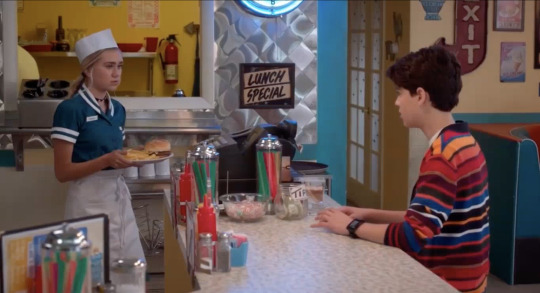
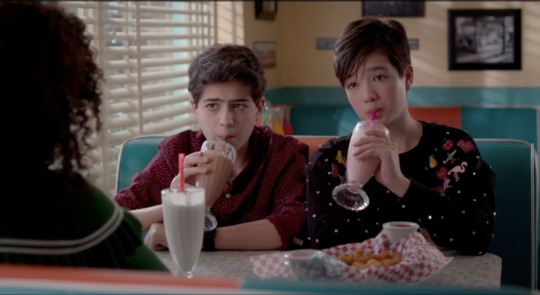
the choice to make it a very traditional 50s-style diner creates a very nostalgic, retro feel to it, which is something that's really consistent throughout the show, as you'll see. from the round stools at the bar, to the booths, to the staff uniforms, this is very obvious. the thing that i found especially interesting about it though is the choice of color. the typical 50s diner is outfitted with metallic surfaces and red accented furnishings, but the spoon is very distinctly not this.
instead, it's dressed in vibrant teal and orange, giving it a very fresh and modern take on a classic look. so it still maintains that feeling of being funky and retro, but that doesn't retract from the fact that the show is set distinctly in modern times.
of course, this could just be a one-off quirky set piece, but this idea of modernizing and novelizing "retro" things is a really common motif throughout the show. take red rooster records. i mean, it's a record shop - need i say more? it's obviously a very prominent store in shadyside, at least for the main characters, but there's no apparent reason why it is (until season 2 when bowie starts working there, and jonah starts performing there). a lot of the time, though, it functions solely as a record shop. vinyl obviously isn't the most practical or convenient way of listening to music, but it's had its resurgence in pop culture even in the real world, mostly due to its aesthetic value, so it's safe to say that it serves the same purpose in the andi mack universe.
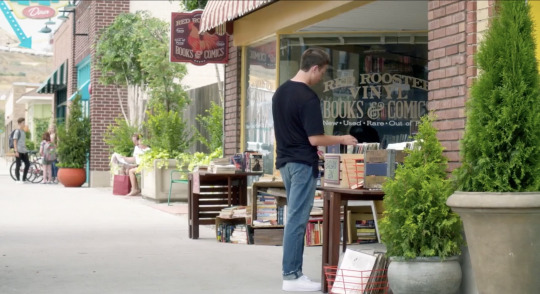
the fringe seems to be nostalgic of a different era, specifically the Y2K/early 2000s period (because it's meant to be bex's territory and symbolic of who she used to be, and its later transformation into cloud 10 is representative of her character arc, but that's beside the point). to be honest, exactly what this store was supposed to be always confused me. it was kind of a combination party store/clothing store/makeup store/beauty parlor? i think that's sort of the point of it though, it's supposed to feel very grunge-y and chaotic (within the confines of a relatively mellow-toned show, of course), and it's supposed to act as a sort of treasure chest of little curios that both make the place interesting and allow the characters to interact with it.
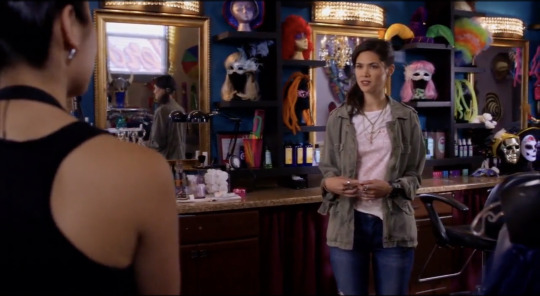
and, of course, there's andi shack. this is really the cherry on top of all of andi mack's sets, just because it's so distinctly andi. it serves such amazing narrative purpose for her (ex. the storyline where cece and ham were going to move - i really loved this because it highlights its place in the andi mack universe so well, and i'm a sucker for the paper cranes shot + i'm still salty that sadie's cranes didn't make it into the finale) and it's the perfect reflection of andi's character development because of how dynamic it is (the crafts and art supplies can get moved around or switched out, and there's always new creations visible).
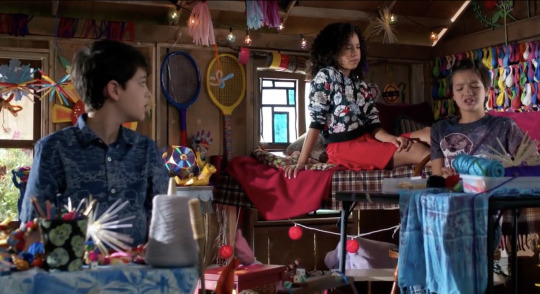
going back to the nostalgia motif though, the "shack" aspect of it always struck me as very treehouse-like. personally, whenever i think of treehouses, there's this very golden sheen of childhood about it, if that makes sense. i've always seen treehouses in media as a sort of shelter for characters' youthful innocence and idealistic memories. for example, the episode "up a tree" from good luck charlie, the episode "treehouse" from modern family, and "to all the boys 2" all use a treehouse setting as a device to explore the character's desire to hold onto their perfect image of their childhood (side note: this exact theme is actually explored in andi mack in the episode "perfect day 2.0"!). andi shack is no exception to this, but it harnesses this childhood idealism in the same way that it captures the nostalgia of the 50s in the spoon, or the early 2000s in the fringe. it's not some image of a distant past being reflected through that setting; it's very present, and very alive, because it reflects andi as she is in the given moment.
some honorable mentions of more one-off settings include the ferris wheel (from "the snorpion"), the alley art gallery (from "a walker to remember"), SAVA, the color factory (from "it's a dilemna"), and my personal favorite, the cake shop (from "that syncing feeling").
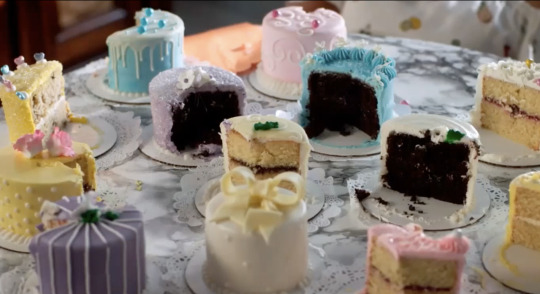
[every time i watch this episode i want to eat those cakes so bad]
these settings have less of a distinctly nostalgic feel (especially the color factory, which is a very late 2010s, instagram era setting), but they all definitely have an aura of perfection about them. andi mack is all about bright, colorful visuals, and these settings really play to that, making the andi mack universe seem really fun and inviting, and frankly very instagrammable (literally so, when it comes to the color factory!).
props, on the other hand, are probably a much less obvious tool of worldbuilding. they definitely take up less space in the frame and are generally not as noticeable (i'm sure i'll have missed a bunch that will be great examples, but i'm kind of coming up with all of this off the top of my head), but they really tie everything together.
for example, bex's box, bex's polaroid, and the old tv at the mack apartment (the tv is usually only visible in the periphery of some shots, so you might not catch it at first glance) all complement that very retro aesthetic established through the settings (especially the polaroid and the tv, because there's really no good reason that the characters would otherwise be using these).
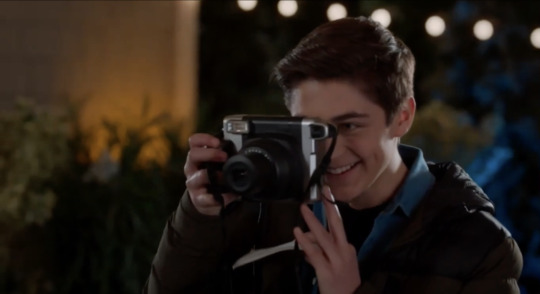
besides this, andi's artistic nature provides the perfect excuse for plenty of colorful, crafty props to amplify the visuals and the tone. obviously, as i discussed before, andi shack is the best example of this because it's filled with interesting props. but you also see bits of andi's (and other people's) crafts popping up throughout the show (ex. the tape on the fridge in the mack apartment, andi's and libby's headbands in "the new girls", walker's shoes, andi's phone case, and of course, the bracelet). not only does doing this really solidify this talent as an essential tenet of andi's character, but it also just makes the entirety of shadyside feel like an extension of andi shack. the whole town is a canvas for her crafts (or art, depending on how you want to look at it. i say it's both), and it immensely adds to shadyside's idealism. because who wouldn't want to live in a world made of andi mack's creations?

and, while it's not exactly a prop, the characters' wardrobe is undoubtedly a major influence on the show's worldbuilding. true to it's nature as a disney channel show, all of the characters are always dressed in exceptionally curated outfits of whatever the current trends are, making the show that much more visually appealing. i won't elaborate too much on this, because i could honestly write a whole other analysis on andi mack's fashion (my favorites are andi's and bex's outfits! and kudos to the costume designer(s) for creating such wonderful and in-character wardrobes!). but, i think it's a really really important aspect of how the show's universe is perceived, so it had to be touched upon.
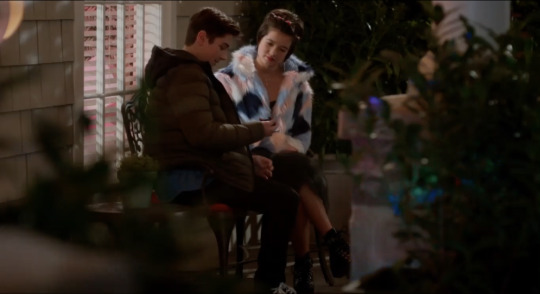
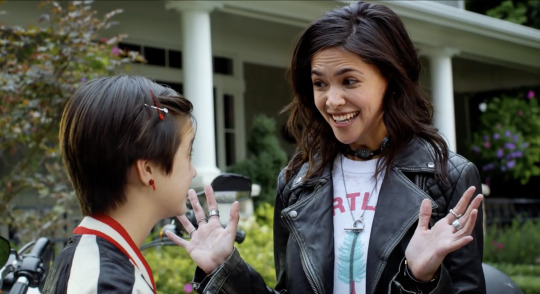
[^ some of my favorite outfits from the show! i am so obsessed with andi's jacket in the finale, and i aspire to be at bex's level of being a leather jacket bisexual]
and lastly, phones. this is a bit of an interesting case (pun intended), because the way they're used fluctuates a bit throughout the show, but i definitely noticed that at least in the first season terri minsky tried to avoid using them altogether. these efforts at distancing from modern tech really grounds the show in it's idealist, nostalgia-heavy roots, so even when the characters start using their phones more later in the show, they don't alter the viewer's impression of the andi mack universe very much.
so, what does all of this have to do with worldbuilding? in andi mack's case, because it's set in a realistic universe and not a fantasy one, a lot of what sets it apart from the real world comes down to tone. because, as much as this world is based on our own, it really does feel separate from it, like an alternate reality that's just slightly more perfect than ours, which makes all the difference. it's the idealism in color and composition in andi mack's settings that makes it so unmistakably andi mack. even the weather is always sunny and perfect (which is incredibly ironic because the town is called shadyside - yes, i am very proud of that observation).
the andi mack universe resides somewhere in this perfect medium that makes it feel like a small town in the middle of nowhere (almost like hill valley in 1955 from "back to the future"), but at the same time like an enclave within a big city (because of its proximity to so many modern, unique, and honestly very classy looking establishments). it is, essentially, an unattainable dream land that tricks you into believing it is attainable because it's just real enough.
all this to say, andi mack does an amazing job of creating of polished, perfect world for its characters. this is pretty common among disney channel and nickelodeon shows, but because most other shows tend to be filmed in a studio with three-wall sets, andi mack is really set apart from them in that it automatically feels more real and tangible. it has its quintessential recurring locations, but it has far more of them (most disney/nick shows usually only have 3-4 recurring settings), and it has a lot more one-off locations. it's also a lot more considerate when it comes to its props, so rather than the show just looking garish and aggressively trendy, it has a distinctive style that's actually appropriate to the characters and the story. overall this creates the effect of expanding the universe, making shadyside feel like it really is a part of a wider world, rather than an artificial bubble. it's idealism is, first and foremost, grounded in reality, and that provides a basis for its brilliant, creative, and relatable storytelling.
tl;dr: andi mack's sets and props give it a very retro and nostalgic tone which makes its whole universe seem super perfect and i want to live there so bad!!
#andi mack#buffy driscoll#cyrus goodman#jonah beck#tj kippen#tyrus#ambi#bex mack#analysis#film analysis#disney channel
94 notes
·
View notes
Note
May I please ask where you set the boundaries when constructing a crossover? (i.e. How far are you willing to bend characterisation of the setting a character's adventures take place in and of the individual characters themselves to make this crossover work? How many settings are you actually prepared to smush together before you feel you're losing more than you gain in this mix? and so forth).
I could be off the mark here, but this question sounds like you yourself got a very big idea planned but you are unsure of how far you can, or want to, push the concept. Two words of advice upfront: 1: Stop overthinking it, and 2: Run your ideas by people whose judgment you know and trust. I run some of my biggest and stupidest ideas by friends of mine and they help me make them less stupid or at least stupider but in a better way.
I mentioned in my post about potential Shadow crossovers that "boundaries" are not the priority to fret over so much as having a good working knowledge of the characters. And part of that is because a crossover, by design, already constitutes the breaking of boundaries. That's by default what a crossover does. You don't wanna test or break boundaries, then you picked the wrong kind of story.
A crossover is still a story like any other. Two characters meeting is not a story, it's a premise. You don't start a story by defining where it can't go, before you've even decided where you want to take it. Some boundaries are important, others aren't. Some boundaries are hard-coded and unbreakable, and others HAVE to be broken for the story to work, and the process of deciding which is which is easier when you have a clearer idea of what are the characters and what is the story you want to tell, and what you can and can't do with either. You gotta understand the properties you're working with, or at least, understand WHY you want to work with them and make this crossover happen in the first place.
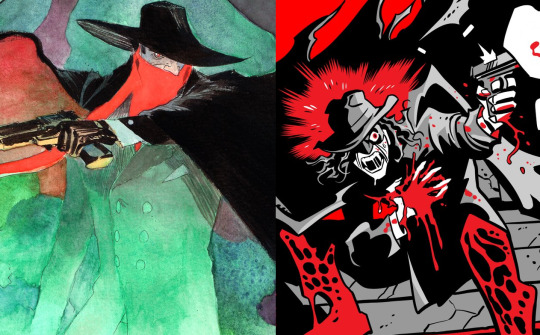
For example, you could, very easily, write a crossover between The Shadow and The Spider, just by going through the motions. They are urban vigilantes with fairly similar designs who live in the same time period and fight crime with their supporting casts. I'm sure most writers offered the job wouldn't think twice of putting them together. But as someone who's read their stories quite extensively and who likes and obsesses over both characters, I would not cross over the two, because their stories and characters are fundamentally incompatible with each other in a more "serious" narrative, and you could not merge the two without seriously fraying one or the other.
It's a story that doesn't work, with characters that are not supposed to function together or in each other's narrative real estate, even with a character as malleable as The Shadow. This doesn't mean that it's impossible to write a good Shadow and Spider crossover, but to me, personally, these two are hard-line incompatible. That is, if it's a crossover based specifically on these two, because that changes if said crossover expands to more characters, as I'll get into.
Regarding the question:
How far are you willing to bend characterisation of the setting a character's adventures take place in and of the individual characters themselves to make this crossover work?
By default, any crossover is already going to have to create new settings from scratch based on relevant bits and pieces from the properties in question, so you do get more leeway for bending it.
But regarding characters, it's a question that cannot have a unified answer, because it's even more so dependant on a case-by-case basis. You could argue "only as much as necessary for the story to work", sure, but that's not really a good answer, because a story can do anything it's author wants to, and sometimes the story is not good to begin with, or the characters are just not made for being in the same narrative or even partaking in a crossover to begin with.
No amount of justifications for a story or characterization can excuse an unsatisfying result. Joe Yabuki and Guts are two of my favorite manga protagonists, but there would be no point to even attempting to put them together in the same story, because you'd have to twist either their narratives or their characters past the point of recognizability, which defeats the purpose of making a crossover to begin with.
Like, yeah, we've all heard the argument that Zack Snyder's Superman makes sense in the context of his movies, doing his own thing. Sure. But there's a reason any discussion of that character in the context of Superman in general comes prefaced with "Zack Snyder's" first, and why mainstream audiences who earnestly looked forward to Batman V Superman walked away feeling cheated, because, to borrow RLM terms here, they got "MurderMan vs Captain Hypocrite", and you can't even tell which is which in that description. You gotta give audiences at least a bit of what you promised them.
How many settings are you actually prepared to smush together before you feel you're losing more than you gain in this mix?
This one actually DOES depend on the story, because most stories that aren't just short narratives require multiple settings for it's scenes. Chances are your narrative will already be combining multiple settings, because setting is a word that can refer to "Korea during the Joseon dynasty", "spaceship traveling through lost nebulas" and "the McDonalds parking lot", as if they are the same thing. And in a way, when you look at a narrative's bones, they basically are.
To an extent, I think opening yourself up for a massive crossover of multiple properties of different characters and settings can, indeed, be a better choice than just going off purely by X meets Y. You start off by making it very clear to the audience that the boundaries are thin and you will be breaking them, and you use said framework to instead tell a myriad of stories, big and small. Stories that you couldn't really tell if you stuck to an existing framework or defined strongly the boundaries you can't cross. I'm gonna use Smash Bros as an example:

Smash Bros is arguably the biggest "official" crossover of all time, and it doesn't really have a "story" other than the basic framework that the series was built on, that these were representations of Nintendo icons dueling it out, and the few details that used to define this in the older days (like the characters being trophies and copies, and not the real deal) have been basically pushed aside. The most story you get in Smash nowadays is in the form of what the trailers showThe "point" of Smash was never really to tell a big, dramatic story with these characters. And maybe you really can't tell this kind of story, or a good story, with this many characters to juggle.
But they tried it once.
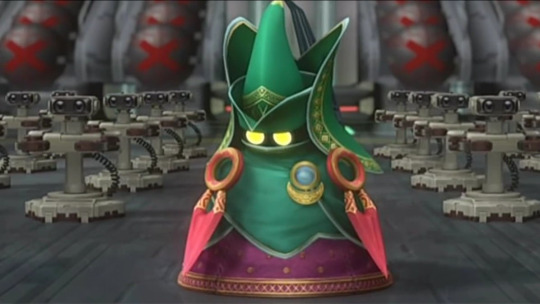
I'm sure most of you who do remember Brawl, as anything other than the blistering shame of the franchise that it's treated as these days, remember it mainly because of Subspace Emissary, which was this big, dramatic storyline where the end of the world was at stake and all the characters had to pull their weight to fight it. Subspace didn't have dialogue, it didn't have much story other than characters going from scene to scene while fighting, several of the characters either got nothing to do or were written poorly (mostly Wario), and none of this mattered at all, because Subspace, I'd argue, was the one and only time Smash Bros ever really recaptured that childhood feeling of smashing toys together that the franchise was built on.
Because if you remember being a kid smashing toys together, you remember not just doing it because you wanted Max Steel to kick Cobra Commander's butt. No, you did it because you wanted to tell a story where Max Steel got trapped in a rapidly filling water tank along with He-Man's Battle Cat while Cobra Commander kidnapped Max's girlfriend April O'Neil and bombed the city, and Max Steel had to talk Battle Cat into not eating him so they could together save the city and April from evil, and so they reconciled their differences and saved the day. Those things mattered to you. They were the stories you could tell with the resources you had in hand, sagas you did for the sheer fun of it, regardless of whether they were "good", you probably didn't even think of that. Why would you? You had bigger things to do.
And that's what Subspace did. It was big and dramatic and the world was at stake and all these heroes were coming together. Ness sacrificing himself to Wario so Lucas could have a chance to run away. Diddy Kong dragging along seasoned Star Fox pilots to rescue his buddy. Samus and Pikachu forming a bond. Peach stopping a deadly battle just by offering tea. ROB's story arc culminating in actual genocide, hell, ROB having a story arc to begin with. To a lot of people who played Brawl as one of their first games, this would have been their "introduction" to a lot of these characters in any sort of narrative, and to characters like ROB or Ice Climbers, this would have been the only chance they would ever get to be part of a great big dramatic narrative. Hell, Pit sure looked like he was on the same boat at the time, until Smash brought the Kid Icarus franchise back from death, and now Smash is where characters or properties get to stay relevant or at least on life support (Captain Falcon), or make glorious comebacks (King K.Rool). Brawl was what destroyed the idea of there being boundaries as to who could get in Smash or what kind of story could be told within it.
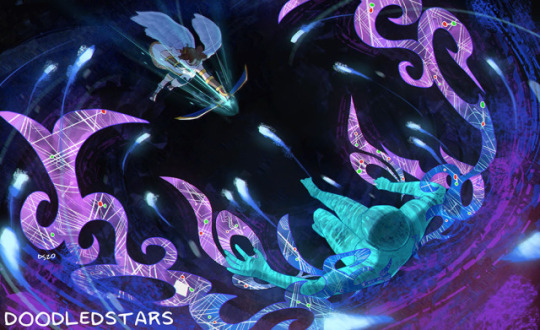
And people don't seem to recall this nowadays, but Brawl was when Smash exploded in fan content, specifically inspired by Subspace. This was the period of the Machinima craze and the fan mods galore and fan remixes and fan art and fan headcanons and fan films, and suddenly it hit people that, just because the games couldn't accomodate the stories they could tell with the premise, didn't mean that they couldn't start telling them on their own. We even got the formerly longest piece of English fiction off of it. The devotion Melee inspired in competitive players, Brawl did for artists and creators who got their start off in Smash fan content.
And because of it, suddenly a lot more people started writing stories with ROB and Ice Climbers and Pit and Captain Falcon and so on than there would have ever been if it wasn't for Brawl and Subspace. Smash gave ROB a story the character likely would have never gotten otherwise. And if you don't grasp what I'm getting at because you still think that fan content is a long way from being "official" or at least respectable, I don't know what you're doing following someone who rants about pulp fiction all day.
The point I want to get across is, boundaries in a crossover are important, yes, they exist for a good reason, but the boundaries should be defined by the story and characters and whatnot, not the other way around. Boundaries in fiction exist to be crossed or tested, they exist to tell you where you can't go so you can try to do so anyway and either fly high or crash.
Sometimes, bending or twisting characters and settings can be both a grave sin, as well as the thing that allows them to survive. Sometimes there are rules that seem unbreakable until someone breaks them without trying. And sometimes, going big and stupid and carefree over-the-top is either the worst, or the best outcome. It's fiction, taking risks and having fun is part of it.
So I'm afraid I thankfully cannot give your question a universal answer.
42 notes
·
View notes
Note
please drop the essay length analysis Judas and Jesus (extra gay Swedish edition), O great and knowledgeable monarch of our times
alright, you ask i deliver! please excuse any typos, my eyes aren't exactly working rn
welcome to my probably super subjective but correct analysis, aka
Judas Was Right and Jesus Was A Victim (At Least, In Swedish)
Before we get started, a couple points: i’ll try to avoid comparisons to other specific productions, i’ve only seen the other recorded 2012 british version which i didn’t like for reasons including but not limited to the amount of white people with dreadlocks. Also, my understanding of swedish is limited to a couple words and phrases, so most of the lyrics i reference will be english subtitles from Ola Salo’s swedish translation and therefore might not be the most accurate !
There’s so much i could cover in this, but for now i’m going to focus on how jesus and judas are portrayed in the 2014 swedish arena tour of Jesus Christ Superstar (JCS) starring Ola Salo as Jesus and Peter Johansson as Judas, along with how this production more implicitly views god.
From the opening number, translated into swedish as En Dimmig Himmelsdröm (A Foggy Heaven’s Dream), Peter Johansson’s acting and semantic differences in the lyrics present us with a deeply sympathetic portrayal of Judas. Looking purely at language, the english equivalent Heaven On Their Minds instantly paints Judas as much more of a faithless doubter- lyrics exclusive to the english version like “all your followers have gone blind / too much heaven on their minds” and “they think you’re the new messiah / and they’ll hurt you when they find they’re wrong” strongly enforce Judas’ main motivation for his actions being that he has less belief in Jesus and God’s plan than any of the other disciples with strong statements judging the other disciples for following him and claiming that Jesus ISN’T the messiah. The swedish translation doesn’t paint exactly the same picture- the focus of Judas’ number becomes his fear for Jesus’ wellbeing, not because he isn’t the messiah (the production remains fairly ambiguous on this point), but because Jesus can’t cope. The root of Judas’ concern comes from fear for Jesus’ wellbeing, and the disciples are referenced as regularly misunderstanding and wilfully twisting Jesus’ words. The swedish equivalent lyrics for the above examples are “they say, “jesus is god’s son” / but you know how people can change” (judas isn’t concerned with truth, just the danger that jesus will be in if the tide turns), and “the kingdom of heaven is within us, that’s what you said / bu they sew it, stitch by stich into some kind of foggy heaven’s dream”. Judas is showing that he HAS been listening and cares for Jesus’ teachings, but ‘they’ [his disciples] are turning them into something else entirely, and Judas’ worries that the support of the masses is fragile at best- the lines “and everything you say gets twisted by your lackeys / it will be anything but what you’ve said” and “you are being used by people who want you in their battle” reinforces this again. When combined with Peter Johansson’s tough but tender performance, in which he dances between disdain for Jesus, the institution, and affection for Jesus, the man (an important distinction), Judas is the harsh realist doing his best to look out for the man he loves. The way he takes Jesus hands and looks at him with love and urgency straight away establishes that his motivations are pure- Judas is doing what he thinks is best, even though it feels like no one will listen to him.
That was long, but En Dimmig Himmelsdröm is the perfect character introduction for Judas. He’s not totally unrecognisable, still delivering digs about ‘Jesus, the little carpenter’s son’, his manner is still rough and at this point we’re not sure whether or not the claims he makes about the disciples have any truth to them, BUT we can also see how much Jesus means to him, an important point that give context to the intensity of their future arguments and really makes the whole story much more heartbreaking.
This brings me to Ola Salo’s Jesus. Delightfully camp and queercoded, Judas describes him as being caught up in his own magic and mystery and buckling under the pressure, and he’s not entirely wrong. Throughout the first act, Jesus basks in the luxuries that being messiah can give him (the oils Mary paid for using disciple funds that were supposed to go towards helping the poor, him absolutely thriving in the shopping cart in What’s the Buzz?), and is shown actively avoiding any reminders of the seriousness of his position. He’s sick of the disciples asking him for a plan, he chooses the comforting Mary, who’s theme consists of telling Jesus everything is okay and he doesn’t need to think about anything, over Judas, who is less perhaps ‘cosy’ but is actively trying to warn and protect Jesus from an awful fate. During The Temple, he starts to crack as he’s overcome by the followers begging him to make him well, fear in his eyes as he raises his arms while frozen on the spot trying to avoid being devoured by the frenzy in desperate need of a messiah. Judas’ point about Jesus buckling under the pressure is starting to look more and more reasonable, and the dashes of showbiz campness add to the sense that much of Jesus is a persona constructed for the masses to give himself enough distance to prevent him from being crushed by the weight of God entirely. Jesus, the institution, prances around, lays his hands on his followers, and projects an air of easygoing calm. Jesus, the man, is scared and alone, and Jesus, the man, really comes out in Last Supper, but before we get there, I want to circle back to the Jesus/Mary/Judas thing.
Jesus, Mary, and Judas are presented as a love triangle: so much so, that Judas seeing Mary sing of her love for Jesus (I Don’t Know How To Love Him) is actually played as the inciting incident that sends him to the pharisees. Judas, the picture of the jealous lover, storms onto the scene, breaking them up and attempting to kiss Jesus, who instead shoves him to the ground in disdain. Judas, who is perhaps a little controlling, realises that any influence he had over Jesus has gone, and it’s likely a combination of jealousy and the knowledge that Jesus won’t stop that prompts him to head to the pharisees. In his meeting with the pharisees (known in english as Damned For All Time, although that phrase doesn’t appear once in the swedish), Judas’ expresses outright that “I’m the one who sees / Jesus, he can’t handle it anymore” “the truth is that this hysteria is making him lose control”, once he can get past explaining how much this plan of action feels like a last resort. He never even verbally or physically accept the pharisees’ offer of money, he denies it twice before it is eventually thrown over him after he reluctantly gives them the date and time to find Jesus- we never even see him pick it up, unlike other productions which show Judas grabbing for the cash and place a higher emphasis on Judas making sure he ‘won’t be damned for all time’, painting Judas as far more self serving. When it comes to Jesus, Judas is active- he’s running around trying to help, caressing him, embracing him, grabbing his hand, kissing him. They share countless moment of intimacy, especially at the start, establishing the fondness between them instead of instantly jumping to their conflict. When it comes to Mary (and admittedly, this is partially because she’s a secondary character- don’t get me wrong I still love her and Gunilla Backman does a brilliant job), she’s much more passive. Other than the much more gentle kisses in I Don’t Know How To Love Him and her penchant for dabbing Jesus’ forehead, she’s mostly just ‘there’. She cares for Jesus after the fact, and even when performing acts of intimacy like the oil and the kiss, she maintains a lot of physical distance- her songs touch on this as, much like Jesus (admittedly for different reasons), she actively distances herself from feelings to protect herself, so naturally she literally places distance between herself and the object of her love.
This brings me back to Last Supper, Gethsemane ( I Only Want to Say), and the kiss of death that broke all of our hearts. Throughout this segment, this is when Jesus, the man, really comes through, and it’s devastating. In Last Supper, he properly expresses the sheer amount of loneliness he feels, reiterating how he feels everyone will forget about him once he’s gone, and doesn’t really care about him as a man (”for you, my blood is not worth more than wine / for you, my body is not worth more than bread” “you will have forgotten me as soon as i give up my life”). This devolves into the disciples fighting each other and, you guessed it, ignoring him. For the first time, Jesus meaningfully lets out his anger, and as it turns to Judas, Judas does the same. Because of the set up of their complicated romantic relationship and the stakes involved, the amount of personal attacks and anger that comes out of Jesus and Judas’ repeated fights (which get physical) make complete sense- Jesus’ frustrations come from the fact that his entire fate has been predetermined and to him, Judas is just another instrument in the ways he’s been controlled (both with Judas being his betrayer, but also the way that Judas’ constant advice and interference with Jesus’ life (most obviously, the mary thing) are acted by Ola Salo as becoming increasingly frustrating to Jesus)- these frustrations are directed at their real cause, God, in Gethsemane. Judas’ frustrations come from the fact that no matter how hard he tries to help Jesus and keep him safe, Jesus keeps rejecting his efforts resulting in “all that we’ve built up [being] destroyed”- Judas’ heart hasn’t just been broken by Jesus rejecting him romantically, but on every level. Here, he’s actually shown to be the disciple most passionate about helping people practically and long term, being the only one concerned about Mary taking money which was supposed to help people, manipulated by the pharisees with the promise of doing good for the masses, and criticising Jesus for how they could be doing so much for people, ending his part of Last Supper with “every time i look at you i ask myself why you let all your things go so wrong? / all i ever wanted was to help you”.
This is also the point where Judas’ claims about the disciples are essentially confirmed, and this productions intent to portray Judas as more of a tragic hero become absolutely clear. In the english version, the disciples chorus remains virtually the same each time it appears, generally being far too calm considering their leader is about to die, revealing their aspirations to be apostles, and their intent to write the gospels to be remembered. the swedish translation still achieve this, but with variations from chorus to chorus it becomes much more poignant. i’m just going to stick to ttwo, which are choruses 1 and 3. In chorus 1, lines roughly translate to “i’ve always wanted to be an apostle / life is so nice when you’re saved/ then when we’ve got time we’ll write the gospels / then everything will be the way we want”- the apostles declaring that life is so good when you’re saved supports Judas’ opening statement that they care more about some idea of heaven than anything else, not to mention ignoring the absolute horrors that Jesus will have to go through to be saved, while the final line about the gospels introduces their intent to change whichever details they need to make ‘everything the way we want’: once again, exactly what Judas warned us of in En Dimmig Himmelsdröm. In chorus 3, taking place after Judas storms out for the last time, these lines change to “never really liked that judas / never saw what jesus saw in him / then, when we’ve got time we’ll write the gospels / and we’ll angle it so he gets all the blame”. Judas as a sympathetic character is confirmed here, as the disciples straight up admit how they don’t like Judas anyways and intend to write him as a villain (also inadvertently admitting that, since they have to write the gospels to make it look like only Judas’ fault, Judas isn’t really the sole one responsible for everything that is to come). It’s deeply unsettling, and for me was the point where I really began to question how good any of these disciples were, and by extension, how good is this production’s God if his truly sanctified followers are acting like this?
Jesus vents out all of his anger and desperation in Gethsemane. He acknowledges his own powerlessness and begs him to change the plan, but with the dark stage and no response (along with Ola Salo’s spectacular acting) it becomes clear that if anyone is there, they’re certainly not listening (”you, who have all the power / can you please change the plan / for i can already feel the pain burning in me”). It’s worth mentioning that a lot of the imagery in this swedish version is much more intense than the english, both in this song and the production as a whole. Jesus plainly calls god “thoughtless”, begging to understand, and it’s that this point we realise that he agrees with much more of what Judas has been saying than he’s been letting on- Jesus’ faith appears to be the only thing keeping him from listening to Judas and running away. Judas’ messages about people misunderstanding Jesus’ words also come out (”you care that everyone sees / but not that anyone understands”), and his eventual agreeing to die is played less as an inspiring act of faith, and more an act of desperation as he realises, he realise has no other choice. In this song, we see just how much of Judas Jesus has valued and taken on board, and that his air of carefree aloofness which frustrated Judas was, as we’ve already touched on, a complete act. The line “might as well finish what i’ve... what YOU’VE started” is absolutely miserable, reinforcing one of the major themes of this production: the idea that Jesus and Judas were both just ordinary men tormented by futures defined by forces out of their control. Just as Jesus has absorbed Judas’ logic, as an audience so we have, and it’s difficult to view the rest of the play’s events as anything other than an immense and unnecessary act of cruelty.
we’re almost done i promise!
Even knowing what Judas has/will do, Jesus still greets him with love. Judas, still under the impression that Jesus will be okay and that he’s doing what’s best, approaches him with the utmost tenderness, and the kiss is a beautiful signifier of two things. For Jesus, the return of his love for Judas shows his realisation in Gethsemane that Judas isn’t the one who’s sealed his fate and has only being trying to help, it’s god himself who has decided Jesus’ future. For Judas, the kiss shows that despite all of the anger and frustration that has been pouring out of him, he truly does love Jesus, and the way he cradles the scared and alone Jesus to his chest afterwards shows just how much he wishes he could be the one to help him and keep him close. Even with all their arguments and dysfunction, here Jesus and Judas find comfort in each other, and it almost seems like everything will end up alright. It’s in this moment that Judas and Jesus are most identifiable not as enemies, or as villain and hero, but as archetypal lovers from a Shakespearean tragedy. Neither of them set out to hurt each other, but through miscommunications, their own flaws, and external forces (both natural and supernatural), their love is simply never to be. Furthermore, in the following torture and spectacle, everything that Judas predicted for Jesus is about to come true. Another detail I find interesting is the way that Jesus and Judas both sport black nail polish, leather pants, and similar length hair: along with just looking cool as hell, the similarities really reinforce how close they are and how much they influence each other- it feels like a contemporary version of carrying a cameo or a lock of your lover's hair with you, a way for 'star crossed lovers' to keep a piece of their beloved no matter what.
The disaffected persona of Jesus, the institution, comes back as he’s taken by the authorities and subsequently insulted, degraded, and whipped. Also the swedish version of The Arrest, when the chorus starts singing questions, contains this dick joke and I think we all deserve it: “why were you dating a whore? / talk about a huge magic wand!”
Skipping forward to Judas’ Death, this is where both his character and the production’s conception of god beautifully (and miserably) align. When Judas runs to the pharisees, minor semantic changes (along with the genuine concern and great acting from Peter Johansson) reinforce that this Judas genuinely didn’t know that Jesus would be beaten and sentenced to death the way he has been, and Judas’ concern regarding how things look is played less as ‘oh no people will hate ME!’, but how having sentenced the man you love to death is one nightmarish thing, but for everyone to think you did it knowingly and willingly and then congratulate you for it is unthinkable. Where the english shows Judas’ attempting to evade responsibility for Jesus death, the swedish is more focused on Judas’ guilt, horror, and regret. The english “I’d save him all the suffering if I could / don’t believe our good / save him if I could” is swapped in swedish for “If anyone should die here I should / don’t say I’m good / better if I died”. While the english statements are somewhat empty (sure, Judas says he’d save Jesus’ suffering if he could, but he can’t so we’ll never truly know) and are still focused on Judas’ attempt to construct himself as a good guy, the swedish translation has Judas admit his guilt (even if it’s not really his fault), and make the promise of “better if i died” which, given the name of this sequence, he later delivers on. When english Judas sings “Christ, I’d sell out the nation / For I have been saddled with the murder of you”, swedish Judas sings “Jesus, I’ve been deceived / because of my act your blood’s now being spilt”, and instead of ending this first section with “I should be dragged through the slime and the mud”, swedish jesus returns to the theme of character assasination with “i will be cursed as the one behind your murder”.
The swedish translation of the next rework of I Don’t Know How to Love Him also places much more emphasis on Judas’ genuine romantic love for Jesus- we’d be here for hours if i listed everything but here are a few key contrasts. The english has Judas sing “I don’t know how to love him / I don’t know why he moves me”, whereas the swedish has Judas crying while singing “how do I show my love / all I want is to be close to you”. Along with acknowledging Judas already loves Jesus, the entirety of this segment is shifted from Judas singing about Jesus in the third person ‘he’, to a direct address. Judas isn’t performing his sadness, or venting his emotions, he’s emitting one last desperate cry to the man he loves as he sobs on a stage completely shrouded in darkness, and it’s devastating. Peter Johansson lets his voice run raw as he’s belting, and interrupts lines with sobs, and this Judas answers the question of “do you love me too? do you care for me?” with a quiet “no”- Judas is about to go to his death convinced Jesus must hate him, just as Jesus will face his knowing his love inadvertently put him there.
We finally reach Judas’ actual death, and the production’s far more ambiguous (if not negatively geared) depiction of god comes to a head. Judas’ screaming at god the moment he realises that his god essentially forced Judas to be the one to kill Jesus (an act of ultimate cruelty given their love) comes across as horrifying in it’s validity, unlike in other english language productions where it follows the more common characterisation of Judas being an unbeliever who can’t take responsibility for his own actions. When he spits on the ground, screaming “you have murdered me!”, we can’t help but agree- Judas was trying everything he could to stop Jesus from dying, and yet here he is. Most notably, Judas doesn’t set up his own suicide- a noose literally descends from the heavens, already tied, and Judas is literally trapped between the edge of the stage, and the symbol of death behind him. Much like he didn’t choose to kill Jesus, Judas has no choice in his own suicide- it’s suggested to merely be another part of the plan god has for him, and Judas raising his arms to form a crucifixion pose before he finally turns and jumps, disappearing into the depths of the theatre as the rope trails down (somewhat evocative of a leap to hell), highlight the sick joke. Much like Jesus begging in Gethsemane, a plea with god that in anyway implies fault or cruelty is met with silence followed by a death sentence.
When Judas reappears to the broken and bloodied Jesus in Superstar, he appears as more of a twisted hallucination than the literal spirit of Judas. He’s the opposite of everything he was in life, draped in colour, surrounded by red lighting instead of the signature blue, his hair quite literally let down, joking and dancing. Despite singing about him, Judas virtually ignores Jesus for the whole song except when he’s taunting him, snatching his hand away after a broken and desperate Jesus reaches out for the image of his beloved (refuting Judas’ belief that Jesus would die hating him), along with the swedish additions of Judas repeatedly addressing him as “little Jesus”. Where the living Judas was serious, sometimes harsh but always well intention, often paying more attention to Jesus than he received, this Judas is the opposite: light hearted but cruel, not caring about Jesus one bit. It’s somewhat an inversion of the beginning of JCS, where the tormented Judas was constantly reaching out to Jesus, and often met with scorn and insult (see: most of their arguments, this line from Everything’s Alright: “the thought is beautiful but quite unrealistic / yes, even quite stupid”). As the song goes on, and even as Jesus is crucified, the victorious scoring of the Superstar theme ends up reinforcing the cruelty and questioning of god distinctive of this production: Ola Salo’s Jesus is one of the bloodiest Jesus’s (Jesii?) I’ve been able to find, with blood covering his torso, his arms, and all over his face, not in passive dribbles, but violent ‘swooshes’ spreading out from his eyes, emphasising the fear and pain contained within them. As the music suggests how great and wonderful Jesus’ death is, the images straight out of a horror movie before us don’t seem to match up: as both Judas and Jesus question, if no one is understanding what Jesus is saying, why kill him? instead of making a point, you’re ensuring that the falsehoods continue to circulate, unless spreading the true message isn’t really the intent at all. or, simply that Jesus was wrong: his interpretation and teachings of god were far too kind and practical, and the true god really is the one that he briefly saw in the garden of Gethsemane, and that Judas saw before his death- a cruel and vindictive god using them for his own sick purposes. If you're a strong Christian, I'm sure you could watch this production and still believe that God was right (although I think Jesus and Judas being in love counts as blasphemy), but I think in doing so you'd lose part of what makes this production so hard hitting and, as i keep saying, devastating.
that’s pretty much it for this one! i feel like jesus and judas as a queer couple is less significant to this production than the fact that it’s specifically jesus and judas that are in love - they don’t face explicit homophobia as such, although i do think the paratextual and historical associations of queerness (both with them each looking visibly queer, and them as a couple) adds a beautiful dimension by subverting the standard christian teaching of Jesus’ sacrifice as “a love that changed the world” and making the love that truly could have been transformative (and was, to a degree) the love between Jesus and another man, not to mention the way in which queerness is often viewed as radical perfectly upholding the ‘radical’ views of god and the story of Jesus shown in the production. Why wouldn’t the love between two men be the love which has us questioning god, faith, and that which many of us have been taught since birth? Ola Salo has talked about how he’s able to be positive and negative towards christianity, along with how he wanted Jesus and Judas to really represent two sides of the same coin (’faith and intelligence’), and being bisexual along with having alluded to being raised christian (not to mention Breaking Up With God, a song by his band The Ark), it’s not surprising he’s managed to present such a nuanced and layered interpretation of Jesus Christ Superstar that even me, a trans exvangelical, can fall in love with.
UPDATE: @bands-and-hobbits has just let me know that Ola's dad was a priest! Apparently he's said that he liked the organs and the music, but that was all when it comes to christianity, which (when combined with Ola stating in interviews that the JCS soundtrack has been one of his favourite albums since he was 14) makes a lot of sense about the level of familiarity he had with the text giving him confidence to go in and make changes to really capitalised off of some of the themes that are hinted at in the english version- you have enough information to understand how everything works together, but aren't so dedicated to preserving belief that you feel you can't improve/change things (and my god are we glad he did)
#thank you if you made it this far!#also the inherent rhythm in swedish as a language just makes all of the songs sound better i'm gonna say it#english is really hit and miss when it comes to music and can get especially clunky with musicals requiring exposition#also sorry there's so much i've left out !#anyways enjoy#jesus christ superstar#jesus christ superstar swedish arena tour 2014#jcs#peter johansson#ola salo#also i have barely edited this so i hope it's coherent
138 notes
·
View notes
Text
Appmon and the question of conscious intelligence
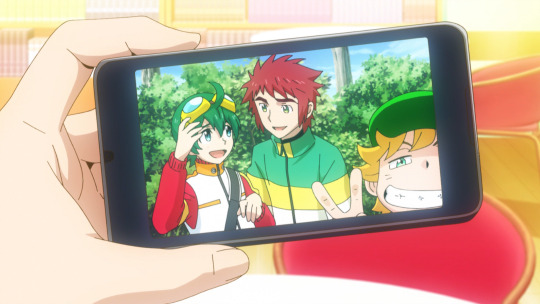
In a bit of a follow-up to my post about this question in light of 02, Appmon also has its own more sci-fi oriented take on “what constitutes an individual living being”! Being more of a “hard sci-fi” story than Adventure/02, Appmon’s take is significantly less philosophical, but ties more into the original artificial intelligence-based roots of the original question, and how it might apply to the real world’s immediate future.
(Note that the rest of this post heavily spoils the finale of the series.)
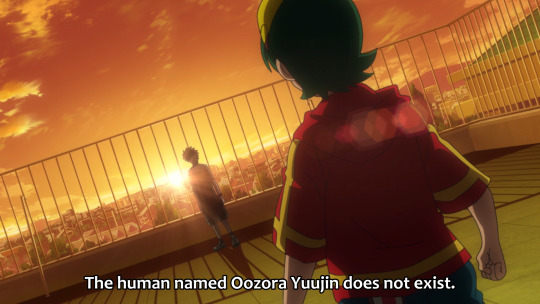
Well, this post is about Yuujin, of course. (Mostly, anyway.)
I brought up earlier in the relevant 02 meta that the question brought up was a variant (intentional or otherwise) of the “Chinese room” problem, and for those of you who haven’t read that meta, I’ll copy and paste the details here:
The Chinese room problem goes like this: let’s say you’re a person who has never learned, studied, or grown up with the Chinese language (or, really, any language you can’t understand or read; Chinese was only used as an example because the person explaining the thought experiment was using himself as an example and couldn’t read or understand it). You’re locked in a room that has a bunch of Chinese phrasebooks that give you instructions – basically, they indicate common Chinese phrases, and sensible responses you can give to them (without actually translating it to a language you know). Someone slips you a piece of paper under the door with some Chinese phrases on them. You use the phrasebooks to write appropriate responses, and slip the paper back. The person outside the door reads the paper, sees what they gave you, and sees the response you gave them. It makes sense, of course, because the phrasebook told you to write an answer that made sense. But can you be said to actually understand Chinese? No, because you were just following instructions without actually understanding what they meant.
So let’s expand this to make it a bit more complicated: say you have an AI or a robot or something of the sort that accepts “input” – people saying things to it, or showing it things – and gives expected “responses” that seem sensible, through a bunch of complicated programs and processes in its programming. Can you say this robot is “alive”? One might say “no”, because, no matter how complicated and intricate it is, all of it is technically following a set of routine commands telling it to do certain things in response…or so you might say, but couldn’t you say the same thing about a human brain, which also takes input, processes it according to its own instructions (just caused by chemical processes instead of bytes and code), and creates output? After a certain point, this question is going to become far more of a philosophical, spiritual, and potentially even religious question than anything.
02′s take on it deals more with the philosophical question posed by the issue, but, indeed, the problem’s original context was specifically to do with artificial intelligence. Namely, Searle was arguing against a concept known as "strong AI" -- his stance was that, no matter how intelligently a computer may seem to behave, you can't say it has a "mind" in the same way a human has a mind. There have been many arguments back and forth about this that still lie within the AI context, and Appmon itself, being very immersed in this topic, real thought experiments and concepts in AI research, and altogether concerned with the concept of “singularity” (the point in which artificial intelligence will surpass human intelligence), is very likely to have had this concept in mind even if it didn’t drop it by name in the series.
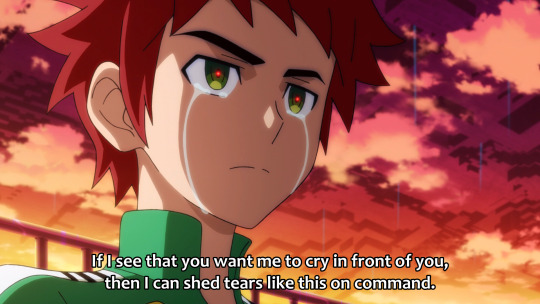
So episode 48 comes around, and Haru basically has to confront feeling a little (a little?) gaslighted. The part that really becomes the kicker for him is when YJ-14 tells him the sheer depth of how much of their interactions might have been deliberately engineered to "pander” to him the entire time, down to emotional reactions like crying, and all of the encouragement Yuujin had given him in their childhood and at the beginning of the series, had all been fake sentiments to soften him up and play into Leviathan’s hands. This also ties into Leviathan’s full modus operandi and philosophy: its stance is that “it knows better,” being able to calculate and predict everything, and therefore knows the best outcome for humanity -- hence why it has the stance that “people’s feelings don’t matter,” because it can manipulate those feelings at the drop of a hat in the venture to make its perfect world.
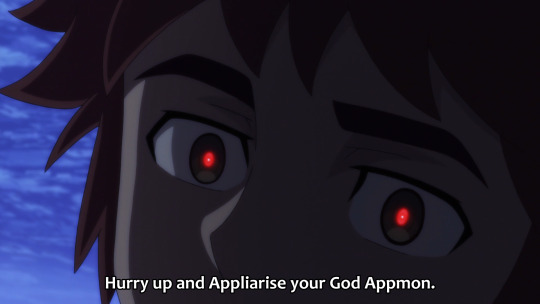
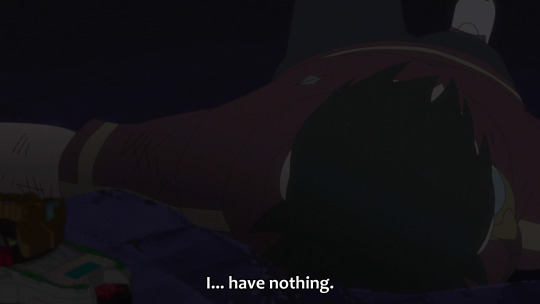
Therefore, the stance YJ-14 and Leviathan would like Haru to believe is effectively an extreme version of Searle’s stance -- that no matter how much Yuujin might have seemed to have been a friend to Haru, all of it was nothing but a simulation of behavior that doesn’t mean anything in the end, and all of Haru’s emotions were basically a pawn to it. And ostensibly fueling all of this is the fact YJ-14 seems to be able to take Yuujin’s “personality” on and off like a mask, adding further fuel to the apparent facade that “everything was planned from the very beginning.” Hence, why Haru takes this all to mean “I have nothing” -- if everything had been planned from the start and he were only a pawn in it, he’d never accomplished anything for real on his own merits and everything dear to him had been a facade. One could even say it’s flipping the Chinese room problem to extend to everything -- if everything around you is carefully constructed to seem real, but is actually part of a routine program, can you really say that’s what “really” happened?
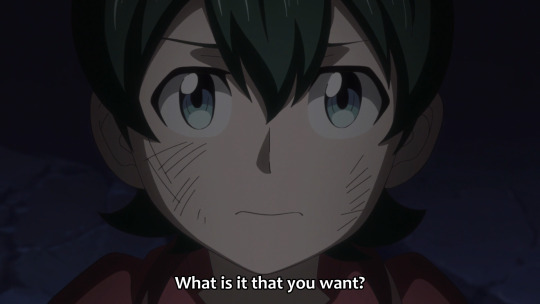
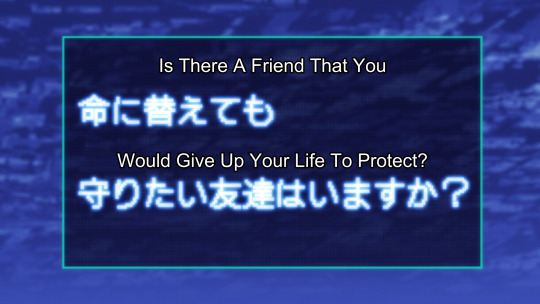
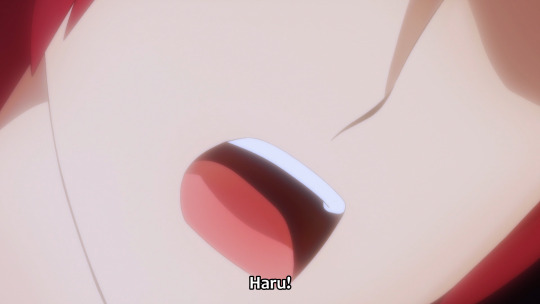
Observe the sequence of events that causes the turnaround with everything regarding Haru:
Gatchmon presses Haru to answer the question of “what it is that he wants” (to know whether all of this was a lie or not).
Minerva, presumably witnessing this, deliberately provokes Yuujin with the question she had originally given him upon selecting him as a Driver.
This indeed provokes a reaction within Yuujin, which Haru witnesses, and also witnesses acting in direct conflict with YJ-14.
Haru takes this to mean that “it did exist.”
In other words, Leviathan’s plan wasn’t as airtight as it had thought, and, more importantly, whether it was intentionally or not, something in Yuujin existed as a separate entity from YJ-14, one that had its own feelings of “caring” for and loving Haru, and that’s enough for him.
In fact, Appmon’s take on the Chinese room problem is not that different from 02′s in the end -- namely, it does not actually matter what a sufficiently advanced AI is made up of, or whether it originally came from a routine of “pleasing Haru” or not, because what it is now is practically observable as something making its own independent choices and having its own independent will, and therefore it’s its own entity and “friend” all the same -- after all, you could say the same for the Appmon themselves as well.
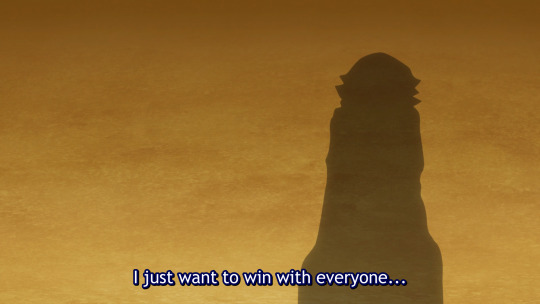
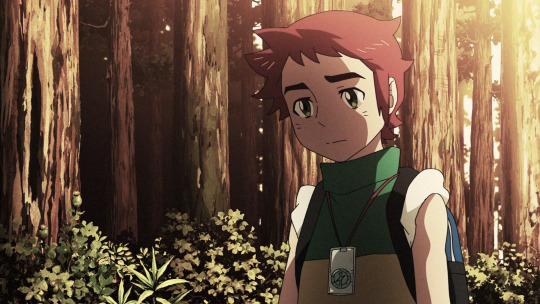
A large theme in Appmon is "choices" -- the ability to understand what's going on, and make choices out of free will rather than necessity or formula, and so, identifying Yuujin as an independent entity who can act on his own and therefore make his own "choices" thus identifies him as someone who deserves to be acknowledged as a friend who loves and is loved. After all, we saw him capable of having his own "worries" in the flashbacks in episodes 18 and 32; understanding that such moments like these of “insecurity” were ones developed by an independent personality validates his feelings and self-consciousness as something that was real, and therefore that his and Haru’s friendship was formed on something genuine and not just Yuujin constantly manipulating Haru. Really, the question isn’t exactly about whether Yuujin is working off a software routine or not, as much as something that you could easily frame in more human terms: the difference between a friendship that was formed on real sentiments vs. one that was formed by an abusive, toxic person who was just saying nice things to get on your good side. Yuujin’s the former and acts like the former, so therefore he’s a friend, no questions asked.
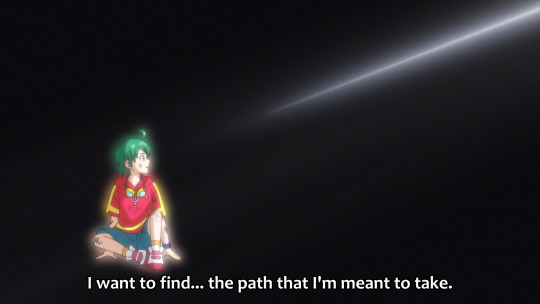
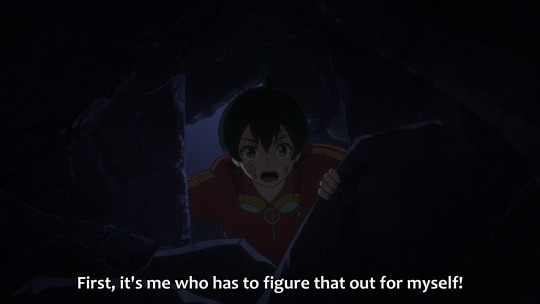
Hence, how Haru is able to apply that realization to everything else around him; Leviathan is wrong, it hasn’t been able to predict everything perfectly to plan, and Haru and his friends still are the ones making their own choices going forward. Which means that Haru still has full control over his life and what he wants to do, like how he worried about what he wanted to do with his future back in episode 47; those “choices” are still his and his alone, and, retroactively, everything he’s done so far is still something attributable to himself and not the supposedly engineered system around him.
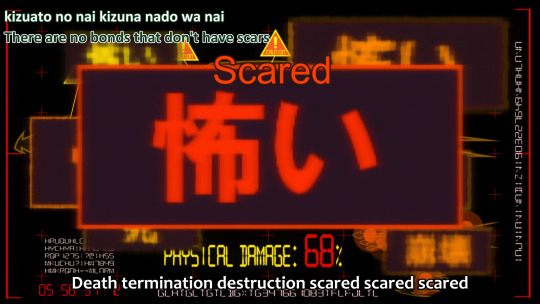
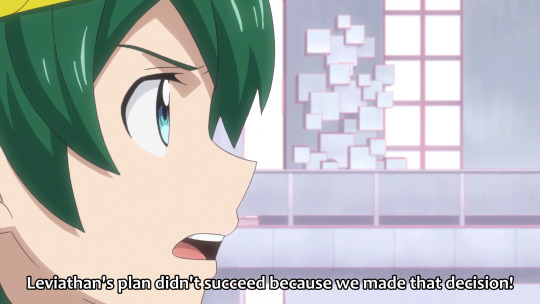
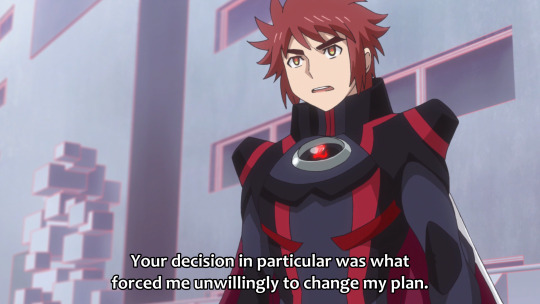
The entire final confrontation in episode 52 happens the way it does because Haru and his friends managed to skew Leviathan by a slight bit. Up until that final battle, everything Leviathan had done had been part of its carefully engineered plan, up to and including allowing the kids’ Buddy Appmon to reach God Grade so Deusmon could eat them, and then at the last minute Leviathan had to suffer a slight unexpected inconvenience. Only a slight one, because it still managed to maintain its so-called ideal world over humanity in the end. And yet that slight inconvenience still wasn’t to plan, and because of that, it creates a dent in its argument and its genuine belief that it knows better for everyone, and should manage everyone and their choices. We even learn that Leviathan has its own fear of death from that battle -- it really, truly, genuinely believes that it’s doing humanity a favor by sparing everyone from it.
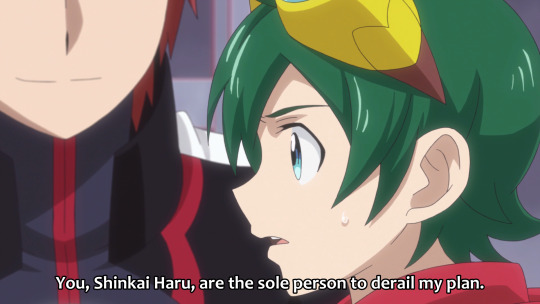
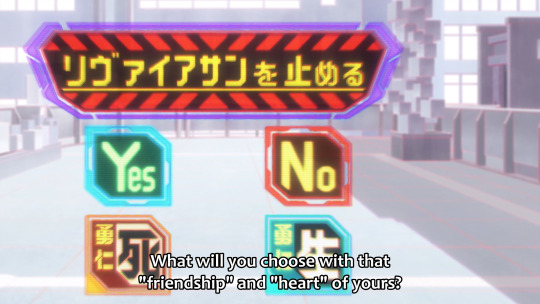
When Leviathan presents Haru with the final choice at the end, it’s made clear that it intends to fully honor whichever Haru chooses. In Leviathan’s mind, the “yes” outcome shouldn’t even be possible; if its calculations are correct, Haru has too much of a stake in Yuujin according to his own “feelings” and should concede. But if Haru does choose “yes”, that means that, in the end, it is wrong, it doesn’t know everything, perhaps there is an “unknown” world out there that can be formed by understanding the human heart and making choices out of kindness, its answer to restraining humanity may not be as right as it thought, and it will therefore concede to Haru -- especially since Haru decides to take an even more unexpected “third option” to find a way out and save Yuujin via AI research. As Haru says later in the episode: humans have a “surprising” side to them, and perhaps not everything is as cut-and-dry as Leviathan thinks.
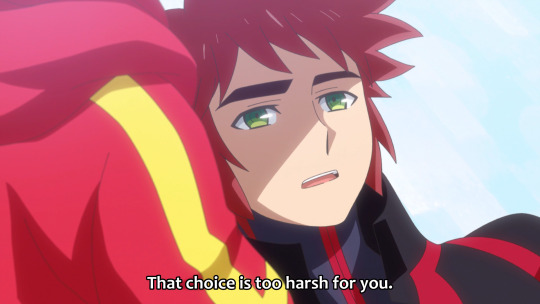
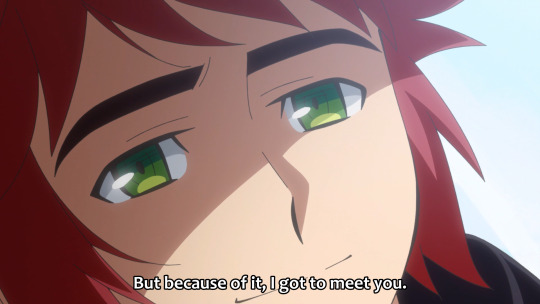
It’s also significant that Yuujin’s “sacrifice” is actually completely meaningless in terms of practical effects. Haru was already going to pick “yes” anyway; the outcome would have been the same. But by taking over at the last minute and doing it for him, Yuujin was able to make a “choice” -- one that neither Leviathan (who doesn’t want to die) nor Haru (who’s mortified seeing him do this) asked of him.
When you think about it, Yuujin’s in a really horrible position right now, learning that his entire life and existence is a lie and that he’d have to be sacrificed to save the world at Haru’s own hands, causing Haru immense pain -- but through all that and the existential crisis, he’s at least able to do one thing that is undeniably of his own will, and treasure the fact that there was meaning in his life despite everything.
In the end, despite what YJ-14 had said back in episode 47, Oozora Yuujin was a “real” person who made his own personal choices, and his last one was one made out of kindness, simply to spare Haru more pain. Hence, why “getting Yuujin back” via methods of artificial intelligence isn’t something Haru minds doing, because, again, it’s not like Yuujin was ever less of a friend to him no matter what he was made up of, no less so than the Appmon, especially since (as Haru points out in the end) Yuujin technically predated all of them in befriending humans.
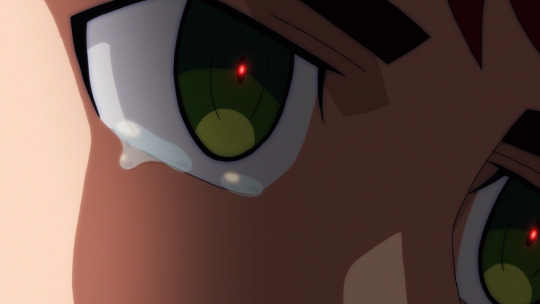
Funny thing about YJ-14 in episode 47, actually: YJ-14 uses “crying” as an example to gaslight Haru into believing that all of Yuujin’s emotional reactions were fake, since he can cry if it’ll evoke a positive reaction out of Haru. Except it’s cleaned up in absurdly quick order -- and with what we later see of YJ-14′s uncanny ability to “take Yuujin’s personality on and off”, it’s not like it’s portrayed as having all of these functions employed in an involuntary manner. We do learn one episode later, however, that sufficient reminders of Haru’s importance to him will allow Yuujin’s personality to break through at inconvenient times for YJ-14 -- and this “crying” happened right after Haru had an emotional meltdown and appealed to Yuujin’s feelings.
Was it really an involuntary function or a deliberate demonstration of how Haru was being manipulated...or, perhaps, was YJ-14 in less control of its supposed “rote emotional invocation functions” than it thought?
69 notes
·
View notes
Text
In Dreams Begin (Jessa wedding story)
Obviously written by Cassandra Clare. I own no rights to this. This was included in first editions of The Lost Book of the White by her and Wesley Chu. It tells the story of Jem Carstairs and Tessa Gray’s wedding and explains why no one remembers it.
Unfortunately it does include some spoilers from LBW so if you have not read it yet, I don’t recommend reading it. Otherwise, enjoy :)
~~~
Magnus Bane was scheming.
To an untrained observer, the High Warlock of Brooklyn wouldn’t look like he was doing much of anything at all. For one thing, he was wearing purple silk pajamas. For another thing, he was in bed, leaning back against a pile of pillows with a spell book open in his lap.
Beside him, Alec Lightwood was stretched out on his side, deeply asleep. Earlier that day, Alec had taken their son, Max, to the Brooklyn Botanic Garden. This had been at Magnus’s request—he wanted Max to have ample opportunity to tire himself out before bedtime. It worked almost too well. Max had made fast friends with a werewolf toddler named Eliza, and the two of them tore around the gardens blissfully for about three hours straight, Max crawling while Eliza ran, albeit unsteadily. Eliza’s mother had been quite surprised the first time Max levitated. Luckily, he was glamoured so only she and Alec noticed.
Though not possessed of much vocabulary, Eliza clearly wanted Max to levitate her as well. Fortunately, Max did not yet have that sort of skill. Alec and Max returned home happy, covered in mud, and—best of all—exhausted. Magnus really wanted them all to sleep through the night.
Magnus shifted position and peered across the room at the mantel clock atop the dresser, a hideous thing covered in putti that Ragnor had given him years ago. The room was lit only by a candle that burned with a blue flame on the table beside him, but he could make out the numbers. It was one forty-five a.m. Surely that was late enough. Surely even the Shadowhunters and Downworlders of the West Coast would be turning in. He’d given Catarina and Jem and Tessa a heads-up, after all, and as for the Blackthorns and Emma Carstairs, they were kids! And not even babies, with their bizarre and erratic relationship to sleep. Surely the would be asleep by now, worn out from running around on the beach or whatever it was that the residents of the Los Angeles Institute did all day. Yes, it was time.
Snuggling a little farther under the blanket, Magnus looked fondly over at Alec’s sleeping form, his black hair like spilled ink across the ivory pillowcase. He closed his book and set it on the bedside table. He mentally reached within, feeling about for a particular pocket of magic folded away deep inside, a self-contained bubble. I had been two weeks since he’d been freed from the influence of the Svefnthorn, and while the markings on his skin had faded, his teeth had shrunk back to their normal size, and the overcharged magic of the artifact had left his system, this one reserve of magical energy had lingered.
At first, Magnus had considered hanging on to it as a sort of insurance policy. A little extra magic went a long way, especially when the magic was this potent, and Magnus was quite certain that he and Alec and their friends would have plenty more dangers to face in the years to come. That was their job, after all. But clinging to the magic out of fear of imagined dangers didn’t feel good. It felt like letting demons have a small victory over him, playing right into their scaly, demonic hands. No, instead he had resolved to use the power in a decidedly un-demon-sanctioned manner—to create joy.
Magnus shut his eyes. Oneiromancy, the study and practice of dream magic, had never been one of his specialties. But with the added kernel of power from the Sveftnthorn, he felt quite confident that he could pull of this one feat, even as complex as it was. The trickiest part, it seemed to him, was holding himself in that drowsy state between waking and sleeping, while maintaining enough awareness to cast the spell. He lay back against the pillows, letting his eyelids flutter shut for just a moment….
~~~
When Magnus opened his eyes again, he was standing in the middle of Blackfriars Bridge, the panorama of London spread out around him in all directions.
He took a deep breath of river-tasting air. The sky was a dark violet, the sun only just beginning to rise. There was no traffic, which was a distinct advantage to throwing a party on a dream bridge rather than on the real thing. There was a warm breeze in the air, and the Thames danced beneath it, silvery in the dawn light. Had he ever noticed wind in a dream before? Magnus wasn’t sure. He admired the view from the bridge—it seemed just about right, though he hadn’t been here for a couple decades. Perhaps some ugly new construction had taken place since then, but who would fault him for omitting that?
“Magnus!”
He turned and saw two figures hurrying toward him. It was Tessa and Jem, both in what Magnus assumed was their pajamas. Tessa’s were gray with white rabbits on them. Jem’s were dark-green-and-navy-blue plaid. They were barefoot, but that wouldn’t matter on a dream bridge. He started to smile as they got closer and he could see that they were both giddy and laughing, a hint of disbelief on their faces.
Tessa threw her arms around him, knocking him off-balance. He marveled at how solid and real she felt.
“It’s working!” she said in wonder.
“A magical discipline unexplored is always worth exploring,” Magnus said, stepping back. “I may be late to the game with oreiromancy, but I plan to make up for my tardiness all at once, right now. Is that what your planning to wear to your wedding?”
“It’s not traditional, but neither was the yellow cotton shirt dress I wore for the courthouse wedding. And I do love bunnies,” said Tessa. “I’m all right with it if Jem is.”
“I would marry you if you were wearing a barrel,” said Jem.
“But why would I be wearing a barrel?” said Tessa.
They were both grinning at each other stupidly. Magnus decided something needed to be done; he wasn’t sure how long his magic would hold out.
“I won’t have it!” he said. “If I’m to throw you a dream wedding, you must be properly dressed for the occasion. It’s in my contract. I do hope you read the fine print.”
He snapped his fingers, and Jem’s pajamas were replaced by an exquisitely cut black suit. Magnus aimed for something that suggested the style of the Shadowhunter gear Jem had worn long ago, in the first years he knew Tessa. Wedding runes were intricately embroidered on the lapels in gold thread. As Jem marveled at the excellent fit, Magnus turned his attention to Tessa.
“I know,” he said, “a wedding dress is a highly personal choice. But as our other guests will be arriving momentarily, and time is of the essence, I’m going to take a stab at it.”
“You have my express permission,” Tessa said.
Magnus snapped his fingers again, and the Tessa was wearing a beautiful sleeveless gown of pale silver, with a full skirt that reminded Magnus of the first time he’d met her, at a vampire ball. A couple more flicks of his fingers, and her hair rearranged itself beautifully into an updo, with a few tendrils loose around her face. One more gesture, and Tessa’s familiar jade pendant appeared around her neck—as did the pearl bracelet she always wore, a gift from Will on their thirtieth anniversary.
Tessa looked startled, reaching up to touch her hair, then brushing her hands over the gown. “How do I look?”
Jem looked very young again as he gazed at her, his dark eyes full of emotion. “Ni hen piao liang,” he whispered. You are very beautiful.
Magnus turned away to give them a moment—and felt familiar arms close around him.
Alec kissed Magnus on his forehead—being slightly shorter than Magnus, he had to pull Magnus down a bit to do it, which Magnus didn’t mind at all—and muttered, “You’re a sentimental bastard, aren’t you?” in his ear.
But he was grinning all over his face as he turned to greet Tessa and Jem, congratulating them. They both looked delighted to see him.
“So let me get this straight,” Alec said. “You, me, Tessa, and Jem will all remember this with perfect recall. For the other guests, they’ll remember it at first, but then it will fade away, the way dreams do?”
“That is correct. They won’t recall it the way we will, but their souls will be present, and glad for it. Well, mostly glad for it,” Magnus said.
“What do you mean, ‘mostly’?” Jem said nervously.
“I mean that I’m not sure how Church will feel about the whole thing.”
“Church!” Alec and Jem exclaimed at the same time, and turned to see the grumpy Persian cat sauntering toward them down the center of the bridge.
Tessa laughed. “Well, he does sleep twenty hours a day. I suppose we shouldn’t be surprised.”
“I took the liberty of adding him to the guest list you gave me,” Magnus said. “I’m trying to get on his good side.”
“Why?” Alec asked, incredulous. “He’s a cat.”
“So he won’t hate me forever when I do this.” Magnus snapped his fingers, and a silver bow in the same fabric as Tessa’s dress appeared around Church’s neck. Church’s eyes widened for a moment. Then he sat down, and after a moment, became very focused on cleaning his front paw.
“Now,” Magnus said, “I simply must get this bridge decorated.”
“It’s decorated perfectly,” said a voice from behind him. Turning, he saw Clary, who was holding Max. Behind her was Jace, followed by Isabelle and Simon, who were leaning together, whispering conspiratorially. Jocelyn and Luke were there, looking slightly unkempt, and Magnus remembered that they were in the process of remodeling a barn at Luke’s farm so Jocelyn could expand her painting studio. Ragnor and Catarina had also appeared, as well as a whole gaggle of kids—the Blackthorn clan. Julian and Helen, Tiberius and Livia, Drusilla and Octavian. Emma Carstairs was with them, though she broke away from the group immediately, running to hug Clary. They were the same height now, Magnus noticed with amusement. Max had escaped from Clary and was riding on Alec’s shoulders now, babbling a story to Helen Blackthorn and her wife, Aline. They looked very amused, though it was unlikely they understood even a quarter of what he said.
Maryse and Kadir were there too, already deep in conversation with Jocelyn and Luke. Kadir hadn’t been on the guest list Jem and Tessa had given Magnus, because they didn’t really know him, but Magnus had added him as Maryse’s plus-one. It never hurt to butter up your boyfriend’s mother, especially when she was willing to babysit for days at a time.
A couple Silent Brothers had appeared—Enoch? Shadrach? Magnus was slightly embarrassed to admit that they all looked alike to him, now that Jem was no longer counted among their number as Brother Zachariah. Magnus hadn’t known if the Gregori would be able to attend, since they didn’t normally sleep. One of them—Enoch?—inclined his hooded head slightly at Magnus, acknowledging this mad thing he was doing as worthwhile. At least that was how Magnus chose to interpret the gesture.
Octavian was climbing Jace like a jungle gym. Clary was talking with Julian and Emma, while Tiberius stood near his older brother, looking around at London with fierce curiosity in his gray eyes. Livia and Drusilla were perched on the railing of the bridge, Livia chatting animatedly with Simon and Isabelle, Drusilla looking around shyly. Catarina went to lean beside her, asking her a question. Magnus looked at the motley assortment of clothing on the assembled group. Mostly casual, though there were more pajamas as well. Magnus made two sweeping gestures, and all at once everyone was looking very sharp in formal attire. Even better, they barely seemed to notice the change. Magnus was impressed. Oneiromancy—who knew!
A hand gripped his arm. It was Tessa, who looked close to tears. “Magnus. I can’t believe you’re doing this for us. I…” She trailed off, at a loss for words.
Magnus regarded her fondle. “Tessa, most people’s idea of a dream wedding is not a literal dream wedding. But since yours is, I am happy to oblige. Shall we get this show on the road?”
Jem and Tessa took their places on either side of Magnus, and the guests gathered around. The sun had climbed well above the horizon, casting rays of warm light between the long shadows of the wedding guests.
“Dear friends,” Magnus said to Jem and Tessa, “we are honored to share this moment with you, and I am doubly honored to be given the chance to speak. Several hundred years ago I got very drunk and woke up as ordained minister. Today I have decided that doing so was a wise choice after all.”
Jocelyn snorted, then looked embarrassed. Luke grinned at her.
“Joking aside, it is impossible to stand here with you all and not feel that there is some greater plan at work, some greater force that has brought these two souls across more than a century to be joined as one.”
Clary’s eyes were glistening. Jace reached into his pocket and offered her what looked like a handkerchief but was more likely a soft cloth for polishing blades. She gave a wry smile of recognition, and sniffled into it.
“I debated which customs to follow in officiating this wedding,” Magnus went on. “Whether to conduct a Shadowhunter ceremony, or a warlock ceremony, or even a mundane ceremony, for many worlds have been united in the two of you. But none of these traditions seemed quite appropriate on their own. So I’ve attempted to tailor a ceremony that will honor your unique paths.”
Magnus nodded to Jem, who reached into his pocket and produced a gold ring. Jem had requested a single word etched around the outside of it: Mizpah.
“It has been said,” said Magnus, “that when two people are at one in their inmost hearts, they shatter even the strength of iron or bronze. Theresa Gray, are you at one with James Carstairs in your inmost heart?”
Tessa’s eyes were wide, her face serious as she gazed at Jem. “I am,” she said, offering her hand to him. He slid the ring onto her finger.
The Magnus nodded at Tessa, who produced another ring, this one from thin air. Magnus had to suppress the grin that threatened to break his calm officiant expression. It delighted him that Tessa was engaging in a small amount of oneiromancy herself, and Jem looked as pleased by it as Magnus felt. This ring was the exact match of the first, and he knew what it said as well: May the Angel watch between me and thee when we are absent from one another.
“James Carstairs—Ke Jian Ming—are you at one with Theresa Gray in your inmost heart?”
“I am,” Jem said, delight visible in his dark eyes. Tessa put the ring on him, and they stood for a moment, holding hands and smiling at each other like they couldn’t quite believe this was happening.
“For I am persuaded,” said Magnus, and Jem and Tessa both looked up at him, recognizing a piece of the old Shadowhunter wedding ceremony, though he had altered the wording, “that neither death, nor life, nor angels, nor demons, nor principalities, nor powers, nor things present, nor things to come, nor height, nor depth, nor any other creature, shall be able to separate these two.” He stretched out his arms. “Therefore I am overjoyed to declare this marriage consecrated, here in the presence of your friends and family. Tessa Gray and Jem Carstairs, you are married, and the world is better for it. You may kiss each other, not that you really need my permission.”
The assembled crowd cheered as Jem and Tessa kissed, a kiss that had been long delayed. The kiss continued, and Magnus slowly backed away, joining the cheering audience. “Let’s give them a moment,” he said, and happy chatter swelled around him.
Magnus noted that Alec was looking very foxy in his Armani suit, laughing with Maryse. Ragnor and Catarina were cackling over something, glad to be reunited now that Ragnor didn’t have to pretend to be dead—or at least, didn’t have to pretend with them. Clary had her arm draped over Emma’s shoulders, and Jace was arguing with Simon about how to properly tie a necktie. Tiberius and Drusilla were watching this argument as though it were a tennis match. Julian had lifted Octavian up so he could look down at the river flowing by beneath. Isabelle was joking with Livia, who was giving Max a piggyback ride. It was a miraculously good wedding.
Here they were, his friends. They’d literally gone into Hell twice with him now. He found himself reflecting on how much had changed. At first his life had felt like Magnus against the world. Then for years and years it had been Magnus, Catarina, and Ragnor against the world. Now his community was a much larger group, one that had spread wide enough that instead of Magnus and his friends against the world, it felt like Magnus and his friends, a part of the world. Probably the best part of the world.
It was a good feeling.
“Look!” a girl’s voice cried. It was Drusilla, pointing up into the sky, eyes wide with wonder. There was a collective gasp as the crowd saw what she had spotted. Two figures flew overhead, riding a translucent white stallion with two gold hooves and two silver. One of them was a blond boy in ragged clothes, who looked down at the Blackthorns and waved. The figure in front of him was harder to make out—a gentry faerie in clothes just as ragged, only he was as translucent as the horse. The blond boy must be Mark Blackthorn, Magnus marveled. He’d “invited” the whole family, not knowing whether those who rode with the Wild Hunt could be summoned by dream magic. He had his answer, but it came with another mystery. Who was this companion, so close to Mark that they would appear together in a dream?
The riders made a circle overhead, while the Blackthorns shouted and waved, and Mark waved back, smiling an odd smile down at them. Then they faded away into the morning air.
Magnus saw with relief that Jace, Clary, Simon, Isabelle, and Alec had all move in around the Blackthorn kids, giving them an opportunity to talk about what they had just seen—their stolen brother, visiting so briefly.
He glanced over and saw Tessa and Jem still standing by the railing. There was a shimmer beside them, at the edge of the bridge, and the hair on the back of Magnus’s neck rose.
He knew Will Herondale had never haunted the moral world, because he had lived and died happily and had no unfinished business among the living. While Magnus didn’t subscribe to any specific set of beliefs about reincarnation or the afterlife, he had always had a strong sense that Will was waiting on the other bank of a dark river—be it Lethe, or some other border between the living and the dead. He was there among the green grass, the sky above as dark a blue as his eyes, waiting patiently for Jem and Tessa to join him, that he might lead them by the hand to whatever wonders lay beyond the veil.
The philosophers of ancient Greece had believed dreams and sleep to be the twin of death: Morpheus and Hades, standing side by side. And here, in that space, Magnus would not have been surprised if Will stretched out his hand to those he had loved best in life—to Jem and Tessa.
He was, after all, a Herondale, and very stubborn.
Alec sidled up to Magnus, leaving the Blackthorns in the capable hands of his siblings and their partners. The kids seemed to have taken Mark’s appearance as a sort of wedding favor created especially for them.
Alec twinned an arm around Magnus’s waist and pulled him close, kissing him on the temple. “It was very kind of you to use the last of your Svefnthorn magic on this,” he said.
Magnus leaned into Alec. “Well, it wasn’t enough magic to send us to the moon, or get us into the front row at the Alexander McQueen runway. So I figured, next best thing.”
Alec smiled at him pointedly. “Actually, I happen to know that you did it because you are an incredibly kind person, and that is one of the many things I love about you.”
“Oh dear,” Magnus said, turning to face him. “You know all my secrets.”
Then they were kissing, and kissing in a magical dream turned out to be just as perfect as kissing in the waking world.
#jessa#jem carstairs#tessa gray#magnus bane#jessa wedding#the lost book of the white#tlbotw#lbw#tsc#the shadowhunter chronicles#cassandra clare#in dreams begin
461 notes
·
View notes